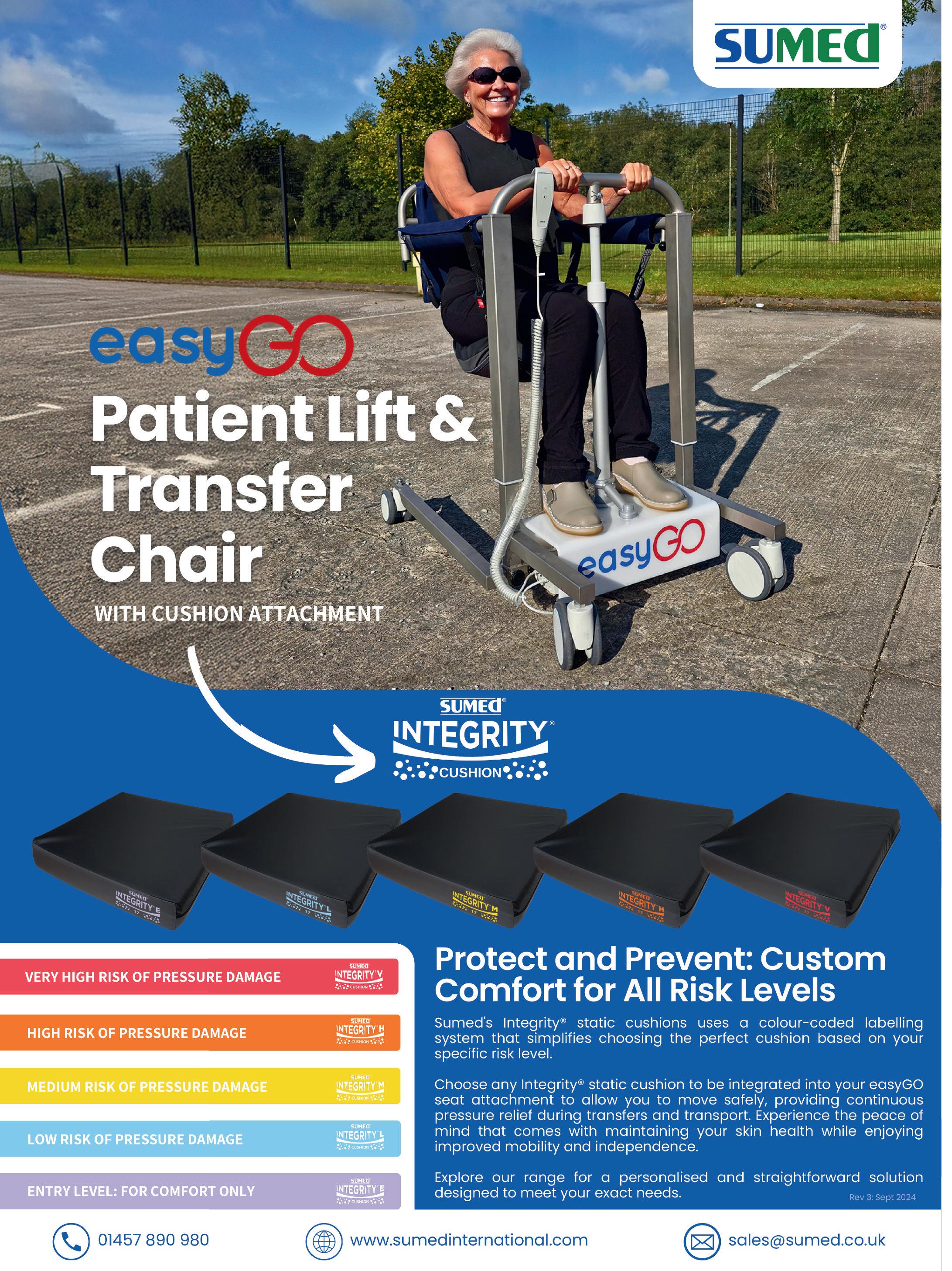


















and retention challenges these changes could be a vital opportunity for care employers to attract more domestic workers, especially as current statistics reflect some critical shifts in the workforce landscape
According to the Skills for Care report the sector saw promising developments with the number of filled posts growing to 1 71 million and vacancies falling to 131 000 daily for the second consecutive year However retention remains a major concern as 24 2% of care workers left their jobs in 2023/24 Encouragingly the turnover rate among independent and local authority employers fell below 1 in 4 (24 8%) for the first time since 2014/15 down from 29 1% the previous year
The care workforce also witnessed demographic shifts, with men now accounting for a record 21% of the workforce This is a positive step for gender balance in the predominantly female sector where men’s representation had remained static at 18% for over a decade until 2022/23
Despite these advances much of the sector’s staffing growth has been driven by international recruitment In 2023/24 105 000 international recruits joined the independent care sector while the number of British workers shrank by 30 000 Over the last two years, 185,000 international recruits have entered the workforce, while British workers decreased by 70 000
These figures highlight the care sector’s dependence on international labour and the pressing need to make care roles more appealing to domestic workers
The Employment Rights Bill which aims to enhance worker security through guaranteed hours and other improved terms could help in this respect For care providers struggling to recruit locally better employment conditions may attract more UK-based workers
Yet without proper funding these new rights could place immense financial pressure on already stretched care providers, potentially pushing some toward insolvency
Councils have warned that unless the government acts in the Budget and Spending Review local authorities in England face a funding shortfall of £54bn over the next five years – leaving the prospect of them providing ‘little more’ than care services by the end of the decade in order to avert financial insolvency
It is crucial that the government ensures that these new employment standards are supported with adequate funding Otherwise the sector could face unintended consequences jeopardizing the very care services they seek to protect
On a brighter note, we would like to thank everyone who visited us at the recent CARE SHOW at Birmingham s NEC Your feedback and engagement were much appreciated, and it was encouraging to see such dedication and enthusiasm across all levels of the sector even in challenging times The show reaffirmed that care is a sector with wonderful career progression opportunities and we are excited to see this enthusiasm grow
I can always be contacted at editor@thecareruk com and encourage our readers to sign up for our bi-weekly digital newsletter at www thecareruk com and follow us on social media for all the latest news
At THE CARER, we are calling on our readers for help
As you may have seen in our appeal for support The CARER has always been delivered in print and online free of charge since 2004 including the sector's only weekly digital issue
We are committed to keeping you informed with the latest news, views, products, and services on the sector s most popular adult social care website www thecareruk com , which receives almost 4,000 visits and 26,000 page reads every day

However, with costs rising significantly, we recently put out an appeal for support
We extend our heartfelt thanks to readers who have responded and pledged their support with a £10 donation covering the next two years, and thank you also for your very kind words of support too! Your contributions are invaluable and if you haven't yet pledged please do consider supporting us so we can continue delivering quality content
For details on how to contribute please visit www thecareruk com/subscriptions/


• Zero-hours workers: The Bill will ban “exploitative” zero-hours contracts and place a duty on employers to offer guaranteed hours to qualifying workers specifying the dates and times when work will be available Employers must also give reasonable notice to workers when a shift becomes available and make payment for cancelled moved or curtailed shifts
• Flexible working: Employees should have any flexible working request granted unless their employer can with reference to 9 specific grounds demonstrate why it is reasonable to refuse this application
The subtle change here is that employers will now have to show why a refusal is reasonable as well as referring to one of the statutory reasons
• Statutory sick pay: The waiting period before an employee will be eligible to receive SSP will be removed and the Lower Earnings Limit will be adjusted to increase eligibility for low paid workers
Redundancies: The Bill will require employers to collectively consult when contemplating 20 or more redundancies across their whole business rather than, as was previously the case, 20 or more redundancies at a single establishment (e g a single office branch site etc )
Leave entitlements: As with unfair dismissal, parental leave, paternity leave and bereavement leave will all become Day one rights
• Fire and rehire: Employers will be prevented from dismissing employees and then rehiring them on new contracts of employment with less favourable terms, unless they can demonstrate that there is a legitimate business case for doing so
• Tips and gratuities: Employers must produce a policy in relation to the allocation and distribution of tips to employees and must consult with either a trade union or workers representatives when formulating the policy
The bill will also see the creation of an Adult Social Care Negotiating Body to make agreements about the pay terms and conditions of adult social care workers in England
The body would have to have representation from trade unions representing social care staff and sector employers and may have other members while the government would verify how it would operate and reach decisions
Under the bill the government would also be able to ask the negotiating body to reconsider proposed agreements
TURNING A PAGE
Deputy Prime Minister Angela Rayner said: “This government is deliv-
ering the biggest upgrade to rights at work for a generation boosting pay and productivity with employment laws fit for a modern economy We re turning the page on an economy riven with insecurity ravaged by dire productivity and blighted by low pay ”
“The UK s out-of-date employment laws are holding our country back and failing business and workers alike Our plans to make work pay will deliver security in work as the foundation for boosting productivity and growing our economy to make working people better off and realise our potential ”
Too many people are drawn into a race to the bottom denied the security they need to raise a family while businesses are unable to retain the workers they need to grow We re raising the floor on rights at work to deliver a stronger, fairer and brighter future of work for Britain
Vic Rayner CEO of the National Care Forum said: “We welcome any measures to strengthen the rights and improve the pay terms and conditions of the social care workforce who make a significant contribution to our economy and the lives of millions of people ”
It is also encouraging to see that the definition of a social care worker’ in the Employment Rights Bill encompasses the wide diversity of people working in the sector and not just those in registered services ”
However these measures must be accompanied by the financial and wider support necessary for providers to implement them, as well as interim measures to boost care worker pay
“This Employment Rights Bill represents a significant step change in basic employment rights which we welcome and it will be important that employers are supported to deliver these for all workers delivering vital public care services
“The implementation of a Fair Pay Agreement for care workers must be backed by state funding as the matter can t simply be passed to local authorities and employers in an unfunded manner or it will fail ”
“The success of a Fair Pay Agreement is predicated upon the shared efforts of employers commissioners and central government ensuring that resourcing and investment is in the right place to enable sustained increases in wages and the maintenance of pay differentials in more senior roles ”
MAJOR STEP
Nuffield Trust Deputy Director of Policy Natasha Curry said: This Bill is a major step towards giving adult social care the visibility and priority it has been lacking for far too long The provisions on pay and conditions massively strengthen the Secretary of State’s powers and respon-
sibilities for social care staffing making them clearly accountable in a way that has previously been lacking
A Fair Work Agency to enforce rights and standards will be good news for hundreds of thousands of social care staff who often work under precarious conditions The lack of consistent access to sick pay was a serious weakness during Covid-19 punishing staff who did the right thing and stayed home while unwell It is great to see this addressed
A Fair Pay Agreement with legally binding minimum pay terms and conditions would be a crucial step for social care We saw in Skills for Care s report today [October 10] how poor pay and conditions are leading to a fall in domestic workers and an increasing and precarious reliance on overseas recruits
However the new rights and any changes to pay will need to be implemented carefully because social care is in such a precarious state after decades of neglect Many employers are so financially squeezed that suddenly requiring guaranteed hours and additional rights without support could push some into bankruptcy We know that local authorities are already dipping into their reserves to service adult social care services: they have less than no room to absorb new costs ”
“Implementing the new system of negotiated pay and conditions will take a long time – it isn’t clear who exactly can negotiate on behalf of the whole sector In the meantime, staffing is precarious In the upcoming budget, the government will need to consider immediate measures to shore up the system and help to recruit and retain staff – otherwise the situation will be even worse by the time these new rights come in ”
SICK PAY CHANGES
Karolina Gerlich CEO of The Care Workers Charity commented: It is good to see changes to statutory sick pay with the removal of the lower earnings limit and waiting period; care workers should not have to choose between their health and being able to pay their bills
Additionally it is encouraging to see improvements in access to parental paternity and bereavement leave
However we must now look at rates of sick pay that better reflect earnings so that care workers do not have to rely on applications to charities such as ours when they need to take time off work due to ill health
“Moving forward we are interested in more information about the Adult Social Care Negotiating Body
“It will be critical to see who is appointed to this and to ensure that frontline care workers’ voices are central to these negotiations ”

By Dr Julia Lyons, Senior Clinical Lead, Onebright (www onebright com)

Employee wellbeing is an essential aspect of any organisation’s success Work-related stress costs the UK economy over £5 billion annually in lost productivity, sick leave, and staff turnover
Alongside this, there are a variety of factors that affect employees dealing with work-related stress from burnout to long-term sickness and a reduction in work satisfaction
Research has found that employees experiencing work stress are 50% more likely to take time off, leading to a 37% reduction in productivity (HSE 2018) This in turn can impact revenue and productivity
Chronic-prolonged stress can cost businesses up to £2,500 per employee each year
WHAT ARE THE SYMPTOMS OF STRESS AND WORRY?
The symptoms of stress can affect all parts of someone s life including their emotions, behaviours, thinking ability, and physical health No part of the body is immune We look at signs in the workplace that might indicate an employee is experiencing higher levels of stress:
• Absence: taking an unusual amount of time off work
Reduced tolerance: overreacting to situations in the workplace
• Pessimism: focusing too much on the negative aspects of the job
Performance issues: struggling to concentrate or complete tasks either day to day or by set deadlines
• Isolation: reduced social skills or less interpersonal interactions with other colleagues, concerns about what others think
Low confidence: turning down opportunities for development or promotion or plateauing in their career
WHAT CAN YOU DO ABOUT WORK-RELATED STRESS AND WORRY?
You can take action if you notice yourself worrying or signpost colleagues to these tips if you notice that
they may be worrying:
• Maintain balance: Well-being comes from a life with a balance of activities that you value and give you feelings of pleasure achievement and closeness
• Identify your worry: Is it a ‘real’ worry or a hypothetical worry? If it’s the latter it is important to remind yourself that your mind is not focusing on a problem you can solve now and find ways to let the worry go and focus on something else
Postpone your worry: Worry is insistent and it can make you feel as if you have to engage with it right now
Instead deliberately set aside time to let yourself worry and don t worry for the rest of the day
Apply self-compassion: Worry can come from a place of concern We worry about others when we care about them Responding to our own or others worries with kindness and compassion can make a huge difference
Practice mindfulness: Learning and practising mindfulness can help us to notice but not engage with worrying thoughts It helps us to let go and break free of worries by staying in the present moment stopping them from taking hold
There are many ways to help workers manage these feelings, including techniques from Cognitive Behavioural Therapy (CBT) that can help people to overcome excessive work-related stress and worry so it doesn’t negatively impact your mental health and body
It s always a good idea to integrate a page on your internal system about how people can access your organisation’s mental health resources, as well as
As
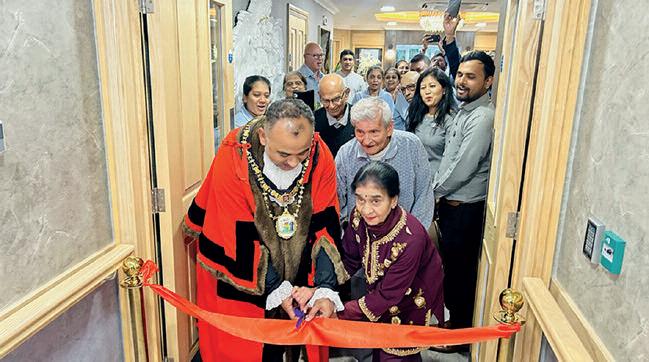
official grand opening of Kailash Manor s residential community, took place on September 26th,
by a ribbon-cutting ceremony attended by guests and excited residents The Honourable Mayor of Harrow Councillor Salim Chowdhury cut the ribbon to formally inaugurate the community As Harrow’s 72nd Mayor, Councillor Chowdhury expressed his excitement and pride in seeing Kailash Manor’s completion emphasizing the development’s contribution to the vibrancy and expansion of the
to
of Harrow
Mayor alongside several new residents came together to mark this special milestone Attendees were treated to refreshments tours of the new facilities, and an opportunity to connect with neighbours and local leaders The team behind Kailash Manor expressed their appreciation to Councillor Chowdhury and all attendees for making the opening ceremony a success “We are thrilled to officially open Kailash Manors Residential Community and to have Mayor Chowdhury here to




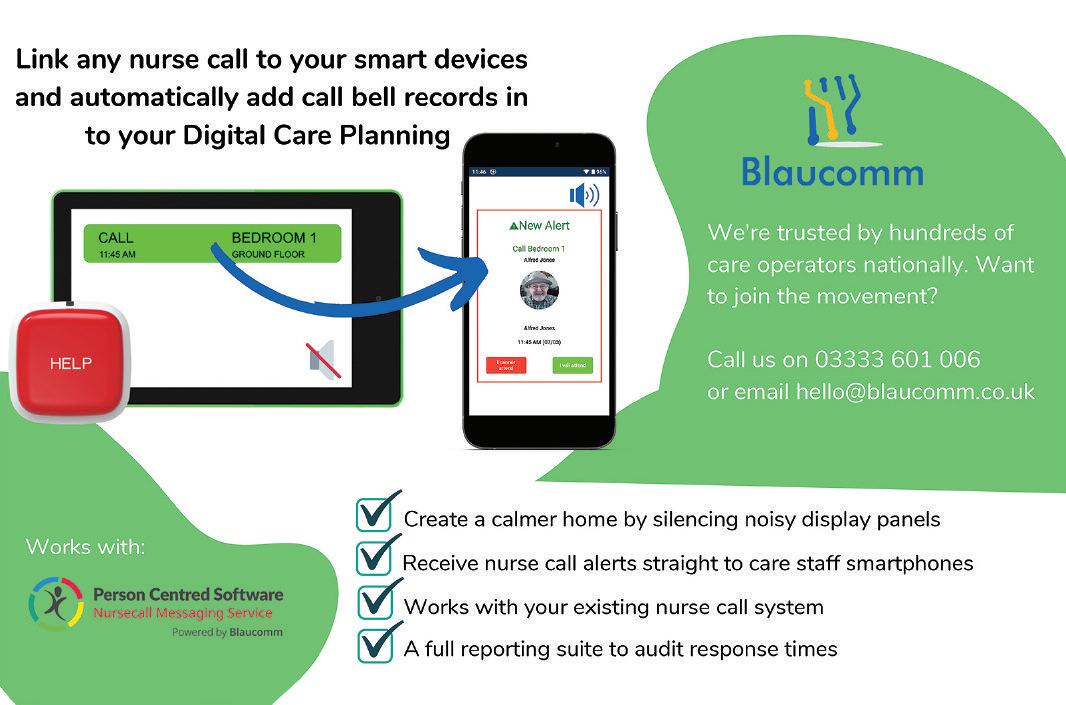

Recent legal cases have highlighted the growing personal liability risks faced by registered managers in care settings This evolving landscape of accountability requires managers to fully understand their legal responsibilities and take proactive steps to protect both their residents and themselves, writes Carl May-Smith,, Barrister at UK and Ireland law firm Browne Jacobson (www brownejacobson com)
RECENT LEGAL CASES HIGHLIGHT PERSONAL RISK
Two recent prosecutions emphasised the gravity of managerial responsibilities in care settings In February 2024 a £10 000 fine was issued to a manager who failed to protect a resident from avoidable harm at Cherry Tree Lodge in Warwickshire A £40
An even more severe penalty faced a manager in April 2023 with a £40 000 fine plus £15 000 in legal costs for similar failures
In each case the defendant failed to adequately protect residents from serious harm, having not followed the necessary processes and systems

These demonstrate that breaching statutory duties under the Health and Social Care Act 2008 can result in substantial penalties and career-altering consequences THE CHANGING FACE OF REGULATION
The risk of prosecution has heightened since 2015 when the Care Quality Commission (CQC) assumed greater enforcement responsibilities
Unlike other regulatory bodies that typically target organisations and board-level directors the CQC has shown increasing willingness to pursue individual managers This shift represents a fundamental change in how care quality is enforced with managers facing personal liability even in situations where they re not directly involved in incidents
UNDERSTANDING PERSONAL ACCOUNTABILITY
Registered managers occupy a unique position within care organizations, serving as crucial intermediaries between organisational leadership and frontline staff
This role carries distinct legal responsibilities that require careful navigation The scope of accountability extends beyond direct involvement in care delivery to encompass the implementation of systems processes and communication channels that ensure resident safety and wellbeing THE COMMUNICATION IMPERATIVE
Communication breakdowns often lie at the heart of legal troubles for registered managers
Effective communication involves not only disseminating safety information to staff but also ensuring adequate follow-up on reported risks and proper escalation of concerns to leadership
Managers must maintain comprehensive documentation of all communications and demonstrate their efforts to address issues with senior leadership
BEYOND FOLLOWING ORDERS
While following organisational protocols generally provides legal protection managers must exercise independent judgement in their role

The courts have shown that managers can be held personally accountable even when their employer isn t liable particularly if they fail to challenge inadequate policies or procedures they should reasonably have identified as problematic
PROFESSIONAL CURIOSITY AND ACTIVE MANAGEMENT
Success in the registered manager role requires maintaining an actively curious approach to care standards
This includes investigating situations where unusually low numbers of issues are being reported and regularly seeking feedback from staff
Managers must ensure they have access to all required policies and procedures particularly when certain aspects of service are controlled by area or central teams
DOCUMENTATION AND RECORD-KEEPING
Maintaining comprehensive records of communications, concerns and actions taken is crucial for legal protection
This includes documenting all issues raised with leadership and staff tracking the progress of concern resolution and keeping evidence of attempts to address systemic problems
Such documentation can prove invaluable if questions arise about a manager's fulfilment of their duties
Open and honest communication with organisational leadership is essential Managers must resist the temptation to downplay quality concerns particularly when safety risks are involved
This transparency helps protect both residents and managers while fostering a culture of continuous improvement
The role of registered manager continues to evolve, with increasing emphasis on personal accountability and regulatory compliance
Success requires balancing organisational loyalty with independent professional judgement while maintaining high standards of care
Recent prosecutions demonstrate that while the role carries significant personal risk these risks can be effectively managed through proper attention to duties and responsibilities
As the regulatory environment continues to develop staying informed and maintaining professional best practices becomes increasingly critical
Registered managers who understand their legal responsibilities maintain proper documentation and exercise appropriate professional judgement will be best positioned to protect themselves while ensuring high-quality care for residents
The cases we ve seen illustrate that the role of registered manager carries serious responsibilities but with proper attention to duties and regular review of practices, managers can successfully navigate these challenges while maintaining the high standards of care their residents deserve




International recruitment drove improvements in the adult social care workforce in the year to March 2024 – but the sector faces ongoing domestic recruitment and retention challenges according to new data from the adult social care workforce development body Skills for Care
The latest State of the Adult Social Care Sector and Workforce in England report shows that the workforce grew (to 1 71 million filled posts) and vacancies fell (to 131 000 on any given day) for the second successive year
24 2% of people working in care left their jobs in 2023/24 Among independent and local authority employers – for whom records go back the furthest – the turnover rate fell to below 1 in 4 (24 8%) for the first time since 2014/15 down from 29 1% the previous year
The number of men working in the female-dominated sector reached a record high, with men accounting for 21% of the workforce It is the first time that men have represented more than a fifth of the workforce since records began – the proportion had been static at 18% from 2012/13 until 2022/23 when it rose for the first time to 19%
However these positive statistics are mainly due to the record level of international recruitment in 2023/24 and the sector is still struggling with domestic recruitment and retention The year saw 105 000 international recruits starting direct care providing roles in the independent sector and the number of people in the workforce with a British nationality shrinking by 30,000 Over the two years since March 2022, 185,000 international recruits joined and the number of British workers fell by 70 000
It is clear from the data that this is not a case of international recruits taking jobs from British people as the number of vacancies across the sector remains high
While the turnover rate for internationally-recruited staff in the frontline ‘Care Worker’ role was 30%, the turnover rate for domestic recruits into Care Worker roles was 41 1% 29% of international recruits were male, but men only accounted for 15% of newly-recruited British care workers
These differences are significant because the supply of international workers is declining According to Skills for Care’s latest tracking data an estimated 8 000 new international recruits started between April
and June 2024 compared with an average of 26,000 per quarter in the year to March – a decrease of over two thirds
Even with the record level of international recruitment in 2023/24 the sector s vacancy rate of 8 3% was still around 3 times that of the wider economy Skills for Care estimates that in addition to filling vacancies, the sector will need another 540,000 posts by 2040 if the workforce is to grow in proportion to the number of people aged over 65 in the population
OTHER FINDINGS FROM THE REPORT INCLUDE:
• The adult social care sector was estimated to contribute £68 1 billion gross value added (GVA) to the economy in England – which is up 13 2% from 2022/23
The number of filled posts increased by 70 000 (4 2%)
In terms of individual job roles social workers filled posts increased the most over the period (1 800 or 7 7%) followed by care workers (48,000 or 5 6%)
The number of personal assistant filled posts decreased by 7 000 (5 4%) the largest decrease of any job role
• The median hourly rate for care workers was £11 – 58p an hour more than the National Living Wage at the time This is slightly less than the previous year, when the differential was 61p Care workers with five or more years experience were on average earning around 10p more per hour than care workers with less than one years experience This is more than the previous year (6p) but has fallen from 33p per hour in March 2016
• 41% of care workers held a relevant qualification at level 2 or above This has been at a similar level since 2020/21 but has fallen from 49% in 2017/18
24 600 adult social care apprenticeships were started in 2022/23 –the most recent year that apprenticeship data is available for This was a 14% drop from the previous year whereas the number of apprenticeships started across all sectors only fell by 3% The number has fallen by 75% since 2016/17
The social care workforce continues to be very diverse with 32% of workers coming from ethnic minority backgrounds compared with 17% of the population
There were an estimated 18,500 organisations providing or organis-

ing, adult social care in England
Of around 210 000 adults older people and carers who received direct payments 65 000 employed their own staff
Skills for Care has led the development of a new Workforce Strategy for adult social care which was published in July 2024 The Strategy –which has the backing of a wide range of organisations from across social care health and education – aims to improve the quality of social care roles, ensuring that the sector can attract and keep enough people with the right skills and values to provide the best possible care and support for the people who draw on it
Skills for Care CEO Professor Oonagh Smyth said: It s clear from our data that international recruitment has been vital in helping the social care workforce grow but we can’t count on this continuing as we re starting to see less of it – and the global job market is a competitive one So we need to stem the tide of British care workers who are leaving their jobs and we can only do that by improving the quality of care roles so the sector can be more competitive in local job markets
The launch of the Workforce Strategy for adult social care in July was a big step forward We know what needs to be done so now all of us with the power to implement the Strategy’s recommendations just need to make it happen
“This includes investing properly in the workforce as part of the journey towards a National Care Service Improving pay is an important step, but focusing on things like training and the infrastructure to enable proper workforce planning are vital too Other sectors can respond to improved care worker pay by increasing their own – but it ll be harder for them to compete with better-paid care roles that are also rewarding meaningful and come with great opportunities to learn and grow
Not only is the social care workforce vital for our society and a meaningful and fulfilling career for so many people, but it will also be central to the success of the new Government s missions to build an NHS fit for the future, kick-start the economy and break down barriers to opportunity Its importance cannot and must not be overlooked
The clock is ticking – we know we re going to need more than half a million more care roles by 2040 and that’s on top of all the vacancies we still need to fill



By Deryn Fisher – Dispute Resolution Solicitor at Parfitt Cresswell
sale is recommended

The death of a resident can be challenging both for their bereaved family and for their carers Unfortunately, it can also be the background for difficult conversations about outstanding fees and who is liable to pay them Care homes need to be aware of legislation and guidance around this issue to avoid breaching consumer law which provides important protections to care home residents and their representatives
The basis for charging will be the care home s contract with the resident and where relevant the local authority or other third party assisting with fees
However the terms of that contract are subject to the provisions of the Consumer Rights Act 2015 which provides that any unfair term in a consumer contract is unenforceable against that consumer
It is inherently unfair that a person be charged for a service from which they will not benefit for circumstances beyond their control however there will be valid reasons why this may sometimes occur When considering what amounts to unfair a court will look to guidance by regulators such as the Competition and Markets Authority (CMA) watchdog to form a decision
Courts may also bear in mind that at the time of choosing a home both residents and their next of kin may have been frail and vulnerable under significant stress and not familiar to the process It is therefore important to make the process as transparent as possible from the outset with the terms set out in a way that is easy to understand
Providers states:
The CMA’s Consumer Advice for Care Home
1 The provider can continue to charge fees for a short, fixed period after death, three days is recommended
2 If the room is reoccupied during this period fees should stop being charged from the date of that reoccupation
3 A care home can continue to charge fees until possessions are cleared from the room but the contract must include a reasonable backstop period – ten days is suggested
4 Staff may clear a room and safely store the deceased s possessions until they can be collected but should inform their representatives first and given them a chance to empty it It is reasonable to charge a fee for this storage but the terms on which this is done should be set out in the contract and reflect costs that you have actually incurred
5 You may also wish to make provision for possessions which are not collected, including disposal or sale after a stated time period providing adequate notice is given to the deceased s representatives If possessions are sold a reasonable price must be obtained and the proceeds money returned to their representative within a reasonable timeframe – a maximum of 30 days after
6 If fees have been paid in advance these should be refunded and the sum repaid within 28 days
It is sensible to include these terms in your contract with residents, so things are clear and unambiguous from the outset
While it may feel awkward to discuss fees and room clearance with grieving relatives it is necessary to bring the details to their attention If done sensitively it will allow them to make informed decisions and avoid the risk of a later dispute If additional requests by a relative are agreed – for example to keep the room unoccupied for longer if they live abroad – then any agreement should be kept in writing WHO IS RESPONSIBLE FOR PAYING THE FEES OF A DECEASED RESIDENT?
Family members are not responsible for paying care home fees which will need to be taken from the resident s estate This will be via their executor or if there is no will by whoever is administering the Intestate Estate
The exception is where a family member has agreed to pay ‘top up’ fees to meet a shortfall between what the resident can afford or the local authority will subsidise Where this happens the relative would have a contract with the care home and it would be this that is enforced
This agreement would typically be on the same terms as that with the resident and/or local authority and you are likely to be in breach of consumer law if it is more onerous
You should also not increase the level of funds payable after a resident’s death to cover any shortfall in government funding REFUNDS
Many residents will have paid fees in advance which exceed the amount required These should be paid promptly (within 28 days) once the appropriate sums have been deducted and the amounts detailed on your final invoice CONSEQUENCES
Failure to meet the statutory test of reasonableness may result in enforcement action by trading standards or the Care Quality Commission
Residents who are unhappy with the terms can challenge them in court and if they are found to be unfair, will not be liable to pay the contractual sums They could also complain to the Ombudsman who can consider and refer to the CMA guidance when considering its findings In summary then it is important to ensure that contracts with residents family members and the local authority are clear and reasonable with reference to the CMA guidance Furthermore they should deal with service users and their representatives openly and with sensitivity so that unexpected charges or removal of possessions does not make a difficult loss more challenging
It will come as a surprise to no one that care is approached differently, in different parts of the world









Cultural differences make an enormous difference In France there are dementia villages without boundaries to the surrounding town but through design the residents stay put and people from town come in to enjoy shared experiences with them

In Japan, where there are simply not enough younger people to look after the elderly they have devised clever design strategies which allow them to operate with lower staff ratios than we generally employ in the West The concept of an information hub related specifically to care retirement and dementia interiors led to the development of the ThirdAge Design podcast and website with listeners in 63 countries Why was this necessary?
UNLOCKING RESEARCH
The breadth of this topic is enormous, and operators, designers and architects are generally time-poor
The Universities of Sterling, Newcastle and Hertfordshire are wellrespected in conducting research but
a wider breadth of information available from other countries which we might adapt to suit UK needs
Generally this must be accessed via individual academic portals to which you must subscribe which can be both time consuming and expensive Simply put the research tends not go to the people who can implement the work
INTERNATIONAL INSIGHTS
Supported by Wissner-Bosserhoff The Third Age Design (TAD) provides an interactive international community hub for care retirement and dementia design with transcripts translated into 12 languages in addition to English The hub subscription is free by signing-up at www thirdage design where the podcast can also be accessed in addition to all usual podcast platforms Topics include: the impact of AI on care settings, elegant bariatric design, and ‘Design Rules and How to
The Football Association (FA) and Alzheimer’s Society have announced that a landmark £1 million has now been raised by the official partnership between the two organisations
The Society and the FA have announced that their partnership has raised £1 million in funding for dementia services

Alzheimer s Society CEO Kate Lee said: “What an achievement for our partnership with The FA! The power of the partnership is clear allowing us to reach huge audiences that we otherwise might not reach and to see that work reflected by hitting the £1 million mark is fantastic
The partnership between The FA and Alzheimer’s Society was extended in July taking it into a fourth season
In the last year of the partnership Alzheimer s Society and The FA have been working to raise awareness of dementia and the importance of diagnosis
FA Chief Executive, Mark Bullingham, said: “We are very proud of our partnership with Alzheimer s Society and reaching the £1 million milestone is an incredible achievement
Together we have created greater awareness of this important cause as well as raising vital funds to support Alzheimer’s Society s ongoing research into the cause and prevention of dementia
Over the last three years, the £1 million raised through the partnership has gone towards crucial Alzheimer s Society support services and research that will help transform the future of dementia diagnosis changing the game for fans and players in
years to come SOME EXAMPLES OF WHAT THAT TOTAL RAISED BY THE PARTNERSHIP COULD FUND INCLUDE:
Almost 76 000 minutes of personalised support from Alzheimer’s Society s Dementia Support Line
• A year’s worth of services provided by 33 Alzheimer s Society Dementia Advisers, who listen to the
needs of people affected by dementia and offer tailored information and guidance
Alzheimer s Society s entire Singing for the Brain programme which brings people affected by dementia together to sing the songs they know and love in a fun and friendly environment
FOOTBALL AND FUNDRAISING FOR DEMENTIA
This season will continue to build on the success of the partnership s ongoing work with a second Alzheimer s International with the England women’s team and a reprise of the Support The Supporters campaign in the Emirates FA Cup and Adobe Women’s FA Cup which initially brought together clubs and organisations across the football pyramid in January 2024 to raise awareness of dementia symptoms
FA staff will once again be taking on fundraising challenges for the charity whilst exciting new plans are in development to use football as a means of providing local support and encouraging fans to engage with vital dementia research
Lee added: Dementia is the UK s biggest killer so there is still work to do, which is why we’re so pleased to be entering a fourth year partnered with The FA to create a future where football is unforgettable ”

PLEASE MENTION THE CARER WHEN RESPONDING TO ADVERTISING

Prevent ever yday wear and tear with Yeoman Shield’s extensive range of easy-clean, wall and door protection
Our attractive, maintenance free, hygienic products protect healthcare environments from costly impact damage, making repainting and repair a thing of the past
Blending with decors, and available in primar y dementia-friendly colours, our designs can include signage, to promote the well-being of patients and aid wayfinding
But we don’t stop at walls Our Fire Door Ser vices are specially designed to offer an extra layer of safety in care settings From regular inspections and repairs to complete replacements, Yeoman Shield’s fire door ser vices help you meet all relevant safety regulations, giving you peace of mind
By Paul Batchelor, partner in the corporate team at Knights (www knightsplc

While the integration of artificial intelligence (AI) into UK care homes presents an opportunity to revolutionise how we enhance the quality of care and operational efficiency it is accompanied by a myriad of legal complexities, particularly concerning data protection and regulatory compliance
The roll out of AI should be treated in the same way as the introduction of any other technology but with a sensitivity to the fear many employees may have around this technology Many of the key risks around the deployment of AI are fundamental HR issues
Often there is an us and them attitude towards AI as if AI is somehow in competition with humans To help overcome this, emphasis should be placed on the way AI can support work just like other emerging technologies have in the past from the typewriter to the mobile phone
There is much discussion about how AI may reduce staffing needs across organisations Yet AI is just a tool like any other The work may change to reflect the new tools available to undertake it but we still need human input We are likely to see employers placing a higher value on emotional intelligence as workers start to engage with and analyse the outputs from AI
The primary legal concern with AI implementation in care homes revolves around data protection Care homes deal with vast amounts of sensitive personal data including health records which are subject to stringent regulations under the General Data Protection Regulation (GDPR) and the Data Protection Act 2018
Care homes must ensure that the collection of personal data for AI purposes complies with GDPR's principles of lawfulness fairness, and transparency Obtaining explicit consent from residents or their legal guardians is essential This involves clearly informing them about how their data will be used stored and shared and ensuring they have the right to withdraw consent at any time
MINIMISING DATA
AI systems should only process the minimum amount of data necessary to achieve their intended purpose Care homes must implement strict data minimisation practices, ensuring that data is collected and used solely for specific explicit and legitimate purposes This reduces the risk of data breaches and ensures compliance with GDPR
Security assurance
Implementing robust data security measures is paramount Care homes must employ state-of-the-art encryption and cybersecurity protocols to protect personal data from unauthorised access loss or damage Regular security audits and staff training on data protection are also critical components of a comprehensive security strategy
REGULATORY COMPLIANCE
Beyond data protection care homes must navigate a complex regulatory landscape when implementing AI The Care Quality Commission (CQC) regulates care homes in England ensuring they meet fundamental standards of quality and safety AI systems used in care homes must be compliant with CQC regulations which may involve demonstrating how AI enhances care quality, improves outcomes, and maintains resident safety Care homes should prepare for CQC inspections by documenting AI implementation processes risk assessments and the impact on care delivery
ALIGNING WITH THE NATIONAL AI STRATEGY
With Labour now taking responsibility to drive forward a revised strategy for the deployment of AI in health and social care in the UK, I
believe there are several key principles that will need to be followed by the NHS and care providers for a strategic plan to be effective:
- Ensure AI systems are transparent and explainable allowing staff and residents to understand how decisions are made
- Establish accountability frameworks assigning responsibility for AI outcomes to specific individuals or teams within the organisation
- Promote equitable access to AI benefits ensuring that all residents regardless of background or condition can benefit from technological advancements
ETHICAL CONSIDERATIONS
Legal compliance is intertwined with ethical considerations Care homes must ensure that AI systems are used ethically respecting residents dignity autonomy and privacy
AI systems can perpetuate or even exacerbate biases present in training data Care homes must implement measures to identify and mitigate bias ensuring fair treatment of all residents This involves rigorous testing of AI algorithms, continuous monitoring, and involving diverse stakeholders in AI development and deployment processes
Respecting the autonomy of residents is also crucial Care homes should provide residents and their families with clear accessible information about AI technologies enabling them to make informed decisions about their use This includes explaining the benefits limitations and potential risks associated with AI
COMMITTING WITH VIGILANCE
The integration of AI into UK care homes offers significant potential to improve care delivery and operational efficiency However managing the associated legal complexities requires a diligent approach to data protection and regulatory compliance By adhering to GDPR principles ensuring compliance with CQC regulations and aligning with the National AI in Health and Adult Social Care Strategy, care homes can navigate the legal landscape effectively
Ultimately, the successful implementation of AI in care homes hinges on a commitment to ethical practices transparent operations and unwavering respect for residents' rights and dignity As AI continues to evolve care homes must remain vigilant adaptive and proactive in addressing the legal and ethical challenges that accompany this transformative technology

Social Care TV continue to fly the flag for highest quality online training for Health and Social Care, after unwavering commitment to excellence within the sector for over 25 years
Their widely-used health and social care specific courses - produced and edited in-house - are expertly designed to make learning engaging informative and therefore highly effective for learners
Accredited by CPD and endorsed by Skills for Care training with Social Care TV is quality assured comprehensive and relevant
As one of the leading online training providers in the health and social care sector in the UK they supply training for local authorities, recruitment agencies, care home groups and other health and social care organisations
Their feature-rich Manager platform has further been enhanced this year with the introduction of several new Manager tools designed to aid with compliance reporting and trainee management Features now available include:
• Compliance Dashboard with Traffic Light System Downloadable Trainee Matrix

•
To enhance their learners' experience further they have created free, comprehensive subject-specific workbooks which were rolled out across all courses this year This unique addition provides excellent value and a fully robust training package
SCTV are delighted to have won several awards over the last 12 months including Best Online Health and Social Care Learning Platform’ – Global Health & Pharma Social Care Awards 2024
• ‘CPD Provider of the Year’ – The
wellbeing of social care workers
SCTV believe that high quality training should be accessible to all and offer regular free courses which include a digital certificate accessible via their website
The company stands behind a clear mission and set of values which define their ethos and their dedication to both the Care Sector and those within it These can be viewed at: Mission Statement and Core Values - Social Care TV (www social-care tv/about/mission-statement-and-core-values)
Social Care TV are a responsible business committed to ensuring that their actions have a positive impact on their employees customers the wider health and social care community and the
It
The Council is proposing to withdraw funding for the service at the end of the current contract in March 2025 as part of wider savings being considered within its Adult Social Care budget This proposal would save the Council £200 000 a small fraction of the overall savings it is aiming to make within adult social care A public consultation on the proposal closed on 17 September and the final decision is due to be made later this month
Oona Goldsworthy Chief Executive of Brunelcare said: “We urge the Council to reconsider the proposal to end this service for vulnerable older people We see the huge benefits this service provides to those we support, and in many cases, transform their quality of life
“The service also results in substantial annual savings for the Council and NHS In Bristol more than 500 households approach the Council each month

because of homelessness related issues We fear that without the support of this service it is likely that more vulnerable people will be unable to sustain their tenancies and will require assistance from the Council s own housing and homelessness team at a considerably higher overall cost to the Council and the NHS ”
Brunelcare has provided this service since 2021 and over this time we have also seen our clients needs and the demands on the service grow in complexity This is mainly due to the change in needs of residents who are nominated to Sheltered Housing, with a significant percentage presenting with mental and physical ill health as well as a history of homelessness and substance abuse
A decision on the proposal regarding the future of this service is due to be made by members of the Council s Adult Social Care Policy Committee on 21 October Brunelcare staff and residents who have been supported by the service will be attending the meeting to raise their concerns in person














Article by Fozia Iqbal, Senior Business Immigration Solicitor

The care sector in the UK is facing an unprecedented crisis, with an 82% drop in visa applications for health and social care roles since July 2023 according to the latest figures from the Home Office This sharp decline is a direct result of the government’s recent policy changes notably the ban on overseas care workers bringing family dependents For many potential applicants this restriction makes the UK a less attractive destination especially for those unwilling to face prolonged separation from their families
However the decline in overseas care workers is not solely due to this policy The cost-of-living crisis in the UK has further compounded the problem
Many care workers who are often paid at the lower end of the salary scale struggle to make ends meet on a single income The inability to bring a second household income from a spouse or partner makes the financial realities of living in the UK even more daunting discouraging many from applying This situation is exacerbated by rising costs for essentials such as housing, utilities, and food, which significantly erode the disposable income of lower-wage workers
Also contributing to the reduction in visa applications is the increased scrutiny and compliance demands placed on employers by government Since late 2023 the Home Office has intensified its oversight of sponsorships in the care sector resulting in lengthy processing delays and burdensome evidentiary requirements Employers are now required to submit extensive documentation, including rotas, contracts and staff details often with very little notice These demands have overwhelmed many care providers leading to delays in hiring and, in some cases, the suspension or revocation of sponsor licences The increased frequency of compliance visits has further strained employers who are already struggling to maintain adequate staffing levels Home Office visits can lead to significant disruptions in business operations especially if they result in the suspension of a licence which halts all further sponsorship and delays pending visa
applications
Harper James
The impact of these issues on the care sector is profound With a large number of vacancies remaining unfilled, the sector is struggling to provide essential services to vulnerable people Despite some arguments that the drop in visa applications could reflect a “natural correction” following the initial surge in demand when the sponsorship system first opened to care workers the persistent high vacancy rates suggest that the need for overseas workers remains critical The combination of restrictive immigration policies economic challenges and increased regulatory burdens has created a perfect storm which threatens the ability of care providers to meet the growing demand for services
To navigate these challenges, care providers must take proactive steps Employers need to ensure they have adequate resources to manage their sponsorship and Home Office interactions and it is crucial they remain vigilant of any abuse or mismanagement of the system and workers Engaging legal representatives to assist with visa applications compliance visits and licence management can help mitigate risks and ensure businesses remain in good standing with the Home Office
Additionally, adopting robust recruitment practices and providing comprehensive support to overseas workers such as assistance with accommodation training and relocation expenses can help enhance retention and attract talent Despite the recent increase in visa salary thresholds care workers still benefit from discounted rates under the Immigration Salary List
Looking to the future while the government is planning to build a domestic workforce such as through Labour’s Fair Pay Agreement and the launch of Skills England, these initiatives are unlikely to have immediate results It could take years to train and recruit enough domestic workers to fill the current gaps in the care sector so the reliance on foreign workers will likely continue To ensure that care providers can maintain services during this transitional period it is crucial that the visa system is adapted to better support the sector s needs
It is clear that the care sector in the UK is at a critical juncture The combined pressures of restrictive immigration policies, economic challenges and regulatory burdens have led to a significant reduction in the number of overseas care workers jeopardising the sector’s ability to meet demand By taking proactive measures and advocating for supportive policy changes care providers can navigate these challenges and continue to provide essential services to those in need
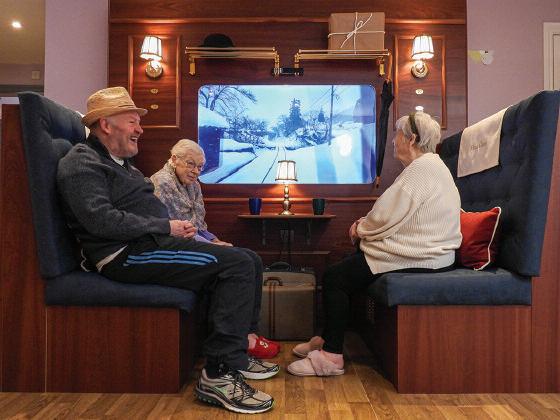
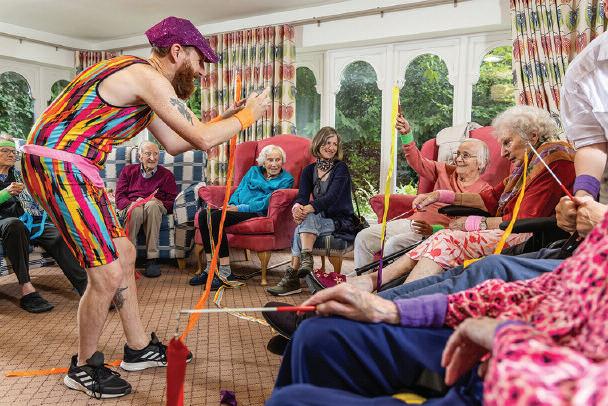

By Phil Dakin, Managing Director, Kroll (www

Getting older is a fact of life But it is not just us as individuals that are getting older but the population as a whole The over-65s now account for 18% of England, and those over 80 – the fastest growing segment of the population – are set to more than double to over six million within the next 40 years
This upward shift in the demographic landscape speaks to improved access to and higher standards of medical care in the UK a resounding reminder of the contribution of the NHS to the social fabric of the country But the NHS is a victim of its own success
While succeeding in extending our lives, it has increased the demands on its own limited resources by expanding the population demographic who exert the greatest pressure on the health service
By extension the adult social care sector and its associated regulator the Care Quality Commission (CQC) are facing similar stresses and are struggling to meet growing demands on capacity amid ongoing resourcing challenges Staff shortages are pervasive across the sector and whilst the recruitment of high-quality workers from overseas had once offered an effective solution new limits on migration in the sector threaten to exacerbate the scale of the resourcing problem
The emerging political emphasis on workers rights has been proposed as part of the solution The Government is moving forward with legislation to enhance the rights of workers and unions in pay negotiations in the social care setting and is hopeful that resetting the balance of power between employers and employees will ease pressures on both the recruitment and retention of staff
It will however come at a financial cost to cash strapped providers who have already felt the effects of price inflation and the energy crisis across the breadth of their essential day to day outgoings Average energy cost rises of 72% across the sector last year paired with annual increases to the National Living Wage plunged two in five providers into financial deficit in 2023 according to the annual Sector Pulse Check commissioned by Hft and Care England, and left almost 40% of providers contemplating withdrawing from the market altogether
For providers in the private sector the autonomy to increase fees provides some protection against eroding margins For those providers reliant on financial input from the public sector however managing upward pressure on costs can prove more challenging and is often made harder by the absence of a long-term sustained funding model for the sector
Against this backdrop professional services firms are receiving more inbound requests from providers seeking advice on how to navigate these pressures Based on our experience, a number of strategies come
When it comes to negotiating funding ensuring that you have the right people in the room to lead the negotiations is crucial Experience shows that former local government commissioners who offer a knowledge of the internal decision-making machinery are particularly well equipped to lead discussions
But providers are cautioned against snap recruitment Funding panels are unlikely to take kindly to firms hiring insiders with the sole intention of swaying funding decisions, and new recruits typically prove more effective advocates once they are embedded in the fabric of the firm
Adopting a constructive approach to engagement is also highly recommended When discussing financial pressures firms should seek to present a clear and itemised picture of the individual costs they face and should be ready to engage in constructive conversations with local government to jointly identify where savings can be made
Recent pressures on the regulator have extended the timeframes for transactions registrations and transfers with implications for providers going to market Similarly lengthy lead-ins on inspections and audits create a distinct set of challenges for those already in operation, including in relation to funding Under these circumstances third party auditors can provide timely assurances on the quality of care and unblock barriers to financing
Putting systems in place to support recruitment
Whilst the new Home Secretary has confirmed that the previous Government s restrictions on migrant care workers will continue to be implemented looking ahead the ongoing review into legal migration by the Migration Advisory Committee could alter the landscape for overseas recruitment In the interim providers should keep on top of sponsor license renewals so that they have the right permissions to make the most of recruitment opportunities as and when they arise
MAKING
Technology is changing the way we work and live and the transition to online processes is becoming increasingly prevalent across sectors We are beginning to see the same replicated in the social care setting with advantages for those providers who have come forward as early adopters The application of technological solutions to processes such as the management of medication for example can both support enhanced health and safety risk management and create efficiencies where homes are stretched for capacity
Times are tough for social care providers and the threat of future economic shocks still looms large
Ensuring that the right systems and people are in place early is essential if providers are to give themselves the best chance of weathering the storm
Ruby Brown was born on 17th January 1936 in a cottage on Milton Lane Woolley Hole to her parents Hector and Doris Parfitt Just two years later on 14th May 1938 Ruby was joined by her younger brother Max who was born on Walcombe Lane in Wells
Ruby started out at an all-girls school but around the age of 8 or 9 the family moved to a bungalow in Leighton, and both Ruby and Max attended Nunney Primary School From there they moved on to Oakfield Road School where Max proudly played in the school cricket team Hector worked as a farm hand at Downhead near East Cranmore while Doris ran the staff canteen at Foster Yeomans Tor Works
After school Ruby was always busy She spent her time helping out at one of the two local shops in Nunney, riding her bike back and forth from Leighton Later she continued to work there full-time always with a smile and a friendly word for everyone
Max s path took a different turn when he was called up for National Service Luckily, he got a more relaxed role as a batman (like a personal assistant) for an officer perfect for Max who s always liked to keep things neat and tidy! When he finished his two year service, he worked in a shop in Frome but always dreamt of becoming a postman which he succeeded in doing for over 25 years
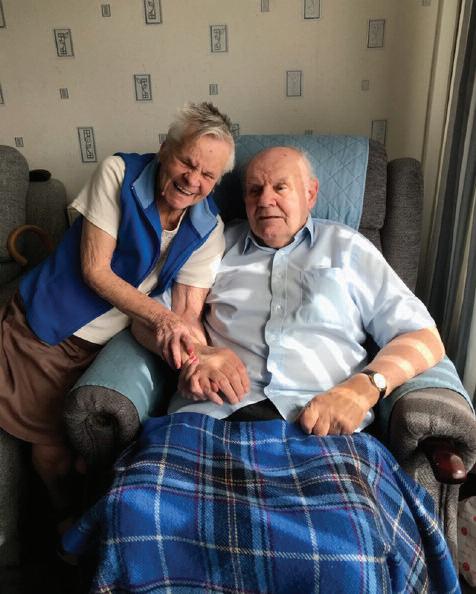
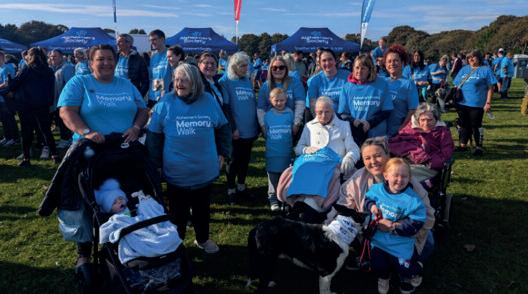
A Party to celebrate a North Yorkshire care home’s veteran friendly status was attended by veterans and dignitaries from across the region
Hazelgrove Court Care Home on Randolph Street Saltburnby-the-Sea held the celebratory event after achieving Veteran Friendly Framework (VFF) status
The accreditation recognises the enhanced care and support available for armed forces veterans at the care home
Deputy Mayor of Redcar and Cleveland Cllr Ian Hart was joined at the event by Saltburn town crier Sharon Wilson, John Hambling and Rob Adamson from Veterans in Care Jules Walker, from the VFF, and Ellen Sharp, from the Hill Care Group, which operates Hazelgrove Court Care Home
Among the veterans in attendance was Philip Hogg, a regular respite resident who served 26 years in the British Army s Royal Corps of Signals

Myrna Carr also attended to represent her husband Ray a veteran of the RAF who lived at Hazelgrove Court before passing away earlier this year
The care home’s current residents and veterans also
A Grantown care home provided a unique setting for a lively traditional music performance
Lynemore Care Home hosted performers from this year s Fiddler of Strathspey music festival entertaining residents with traditional classics like I Belong to Glasgow and The Northern Lights of Old Aberdeen Parklands Care Homes which operates Lynemore sponsored this year s Fiddler of Strathspey Festival and staff were delighted when organisers offered to perform at the care home during the festival

Sue Williams activities coordinator at Lynemore Care Home said We were over the moon when the festival organisers suggested holding a performance at Lynemore
The concert went very well the residents all enjoyed it and many sang along and were tapping their feet to the music
The music really was excellent top class Festival organiser Jo Fry added: “It really was an amazing concert with a tremendous variety of top-quality performers


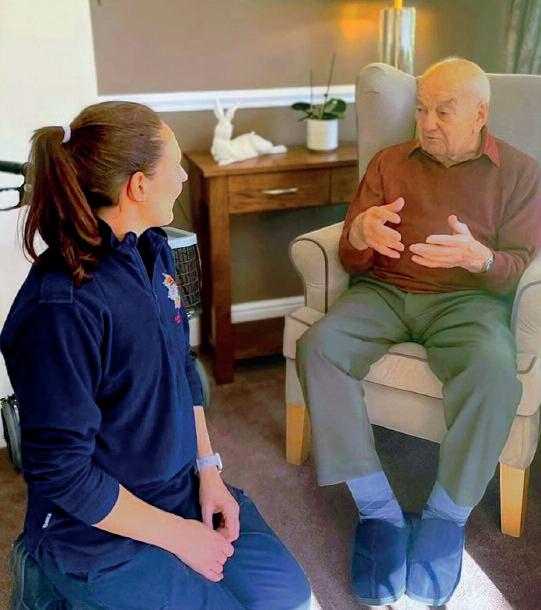





Care England the largest representative body for independent adult social care providers responds to the latest findings in Skills for Care s State of the Adult Social Care Sector and Workforce in England 2024 report RISING WORKFORCE NUMBERS MASK A CRISIS
According to the report the adult social care sector
saw a 4 2% rise in the number of filled posts reaching 1 705 million in 2023-2024 This growth represents an increase of 70 000 filled positions over the last year However, this seemingly positive figure masks a far more worrying reality: vacancy rates remain staggeringly high Though vacancies have decreased from 153 000 to 131 000 they still account for 8 3% of the workforce a rate nearly three times higher than that in the wider economy In comparison the NHS vacancy rate stands at a lower 6 9% further highlighting the unique recruitment pressures faced by adult social care providers
The high vacancy rate continues to exacerbate existing pressures on frontline staff who are frequently forced to manage excessive workloads Additionally, the ongoing recruitment struggles have led to increased reliance on agency staff which in turn inflates costs and destabilises care provision These structural issues are compounded by a lack of long-term government strategy leaving providers in a precarious position
Professor Martin Green OBE CEO of Care England commented: The report s headline figure of more filled posts is welcome, but it does not tell the whole story An 8 3% vacancy rate is unsustainable, particularly when compared to the wider economy and even the NHS This is not just a recruitment challenge – it s a systemic failure to build a workforce that can meet the current and future demands of social care Without immediate intervention we will continue to see a workforce stretched beyond its limits which will directly impact the quality of care provided to some of the most vulnerable people in our society ” RECRUITMENT STRUGGLES INTENSIFY
The report further highlights that the recent increase in filled posts has been heavily reliant on international recruitment However this lifeline is being rapidly cut off due to the changes in immigration policies which prohibited overseas care workers from bringing dependents to the UK Applications for Health and Care Worker visas have plummeted by 81% from April to June 2024 compared to the same period in 2023 Consequently, the latest report reveals that the number of international recruits entering the sector has fallen to just 8 000 nearly 70% lower than the quarterly average from the previous year This sharp decline driven by changes to immigration policy introduced by the previous Government and upheld by the current one is leading to an unsustainable dependence on an increasingly limited domestic workforce
Tens of thousands of British workers have left the sector over the past year disillusioned by low wages poor working conditions, and a perceived lack of career progression The combination of reduced international recruitment and an exodus of domestic workers leaves the sector in a precarious state with many care providers struggling to maintain minimum staffing levels
Importantly the Government s decision to continue with the current restrictions has further intensified the inequalities between the health and social care sectors While overseas carers are not allowed to bringing dependents when migrating to the UK NHS staff and workers in other occupation codes continue to enjoy the ability to bring dependents as normal This stark disparity not only hinders social care providers ability to recruit and retain much-needed international staff but also highlights the unfair treatment of care workers compared to their NHS counterparts The sector is being unfairly burdened by immigration restrictions that undermine the critical role care workers play in supporting the health and well-being of some of the country s most vulnerable people
Professor Martin Green continued: “We are facing a perfect storm Domestic recruitment has collapsed and the government’s immigration policy has choked off the international recruitment pipeline, which has been vital in propping up the sector We cannot sustain this practice What makes the situation even more frustrating is the clear inequality between the health and social care sectors While NHS staff are still able to bring their dependents when migrating to the UK care workers who are just as essential are denied this basic right This unfair treatment further erodes our ability to attract international talent and deepens the crisis Without a meaningful strategy to improve pay and conditions to attract domestic workers coupled with a pragmatic approach to immigration we will be unable to meet the ever-growing demand for care The government must address this before the situation becomes untenable ”
Despite these challenges, the State of the Sector report reveals a significant increase in the economic contribution of the adult social care sector, rising to £68 1 billion in 2023-2024 – an impressive £8 1 billion more than the previous year This contribution highlights the sector s critical role in driving broader economic growth creating jobs and supporting local economies across the country The report makes it clear that social care is not just a public service but a cornerstone of the UK economy with a multiplier effect that extends far beyond the sector itself
Yet, this economic potential remains underutilised With appropriate government investment social care could not only address its workforce shortages but also contribute to long-term savings in other parts of the public sector particularly the NHS The lack of investment risks eroding this crucial economic contribution as the sector s ability to grow and thrive is stifled by chronic underfunding and workforce instability
Professor Green added: The £68 1 billion contribution is not just a statistic – it s a testament to the immense value that adult social care brings to the entire country Every pound invested in social care multiplies, creating benefits not just within the sector, but across multiple industries If the government fails to recognise this and continues to underfund social care, we risk jeopardising this critical economic contribution The Treasury should see this as an opportunity; investing in social care is investing in the stability and growth of the UK economy particularly at a time when every economic lever needs to be pulled
In response to these findings Care England is urging the government to act swiftly and decisively to provide immediate support for the adult social care workforce:
Reevaluate immigration policies that restrict overseas care workers from bringing dependents to support international recruitment address workforce shortages and ensure parity with NHS staff who are permitted to bring dependents
Provide funding to align pay, working conditions, and recruitment benefits of social care workers with those of NHS staff to ensure fairness across the health and care sectors
Recognise the sector s growing billion economic contribution and increase investment to help social care grow create jobs and reduce long-term public sector costs particularly in the NHS
• Consolidate intended reforms for adult social care within a fully funded long-term workforce plan
The need for urgent action is further underscored by the pressures facing the NHS Delays in social care directly contribute to NHS bed shortages and hospital discharge backlogs By addressing the social care workforce crisis the government can also alleviate pressure on the health system reduce costs and improve outcomes for both patients and care recipients as identified by the Secretary of State for Health and Social Care and the Lord Darzi Report
Professor Green concluded: We cannot overstate the urgency of the situation Adult social care is not a sector that can afford to be pushed to the margins of policy The government must prioritise the sustainability of the workforce as part of its broader economic and public health agenda Without this, the consequences will be dire; not just for social care, but for the NHS and the entire economy How many more reports warnings and crises will it take for them to act? We are not just asking for support; we are demanding it – because without it the system will fail and the repercussions will be catastrophic



Barchester s Parley Place care home in West Parley slept out overnight on October 11th to raise funds the local YMCA s Sleep Easy Campaign sleeping out so others don’t have to Resident at Parley Place had been discussing what charities they wanted to support and expressed a concern about the number of people sleeping rough so staff decided to take part in The YMCA’s Sleep Easy 2024 campaign in order to do their bit to help
The team at Parley Place including General Manager Gina Smith Activity Co-ordinator Brian Home Services Advisor, Michelle and Administrator Donna decided to sleep rough at the event to raise funds to support the YMCA to continue with their invaluable work
Our Senior Head of maintenance, Lee and volunteer Andrea helped with the build The annual event asks for local businesses to get involved and join together on October 12th at Talbot Heath school to all sleep out together to raise money and awareness
This is the 2nd year we have taken part last year we built a house out of cardboard this year we choose to build a Wigwam Collecting cardboard tubes donated by The Flooring Factory and sheets of cardboard donated from South West Packaging we designed the wigwam at the home, with residents making the decorations to go on the outside So far the team has raised over £900!

General Manager Gina Smith says: “I am so proud of everyone at Parley Place it has been a real team effort From the staff members who braved the elements Lee who helped to build us a fabulous shelter to all the different members of staff who helped and supported us and of course our fantastic residents who came up with the idea in the first place Sleeping out was a real eye opener for all of us and it is something that no one should have to do Please help us to raise more money to help homeless charities in our area We want to say a huge thank you to everyone who has donated your support means the world


REM have been manufacturing furniture for the Hair & Beauty Sector for over 100 years and are now considered to be one of the largest manufacturers in both the UK & Europe Understanding the growing requirement for Care & Residential Home Salons, REM’s Design Team have produced the Pendle Care Range for the Small, Compact Care Home Salon


When it comes to prediction and prevention of falls it s undoubtedly a case of the more information that we can leverage, the better
It s great news then that the University of Strathclyde and Glasgow City Health and Social Care Partnership (HSCP) have jointly undertaken a research project with the aim of identifying how improved data analysis could help to achieve the more comprehensive picture which clinicians seek
Also involved are telecare providers Tunstall and the Digital Health and Care Innovation Centre (DHI) so it represents an exciting, holistic initiative, analysing the chain that leads from the telecare tech itself and how its outputs are monitored right to the end user experience
With approximately 35 per cent of the population over 65 identified as mildly frail, 15 per cent moderately frail and five per cent severely frail we must urgently accelerate dedicated frailty-targeting innovation
Injuries caused by falls are thought to be a leading cause of hospital admission and death for those aged over 75 with more than four thousand annual hospital admissions in Glasgow – but with the right data-driven support many of those can be avoided also facilitating greater ability to bounce back from illness than would have otherwise been possible
There are great opportunities alongside the challenges – not only to make lives better and reduce fear of falling that can be accompanied by loss of confidence and isolation, but also to realise time and cost savings that can then be redeployed back into the NHS amid an increasingly ageing population
The new partnership’s research champions the use of better more proactivity-led data analytics within telecare equipment – alarm systems designed to keep those considered to be frail safer at home – for timely and early interventions which help to prevent and reduce the longer-term impact of falls
The analysis further notes how Artificial Intelligence (AI) could play a significant role in building more per-
sonalised predictive and proactive models for allocating health resources with enhanced efficiency and effectiveness, both at the right time and in the right place
The partnership placed a focus on their key investigative challenge – how to best leverage the vast data collected across the health and social care system to identify or predict people most at risk from falls and potentially debilitating injuries and what services could work best for them to offset such scenarios
Data accessed from more than 28 000 Glasgow residents who use the telecare system was analysed by researchers for potential gaps in information The research also looked at how data might be better captured for analytics purposes and usage in future research and innovation projects as well as further predicting service users specific needs for better outcomes
The partnership’s research findings encourage a “less risk averse approach to data sharing across organisations” in tandem with system integration and automation in order to produce the most comprehensive, efficient picture possible while reducing admin work for staff
Marilyn Lennon Professor of Digital Health and Care at the University of Strathclyde noted that it is not straightforward to share data but when we do we get great results We have the opportunity to share innovative machine learning for the greater good”
Formal NHS Scotland partner InnoScot Health welcomes this positive research and hopes that it can lead to further workforce-led innovation in a vital area aided by important information campaigns targeting more active lives for Scotland s ageing population such as one launched earlier this year by NHS Highland
InnoScot Health aims to tap into staff expertise and together help to develop new innovations that can help people live better in later life or cope with long-term health conditions
The organisation s frailty innovation call supports NHS Scotland innovators from any NHS health board and any role or medical discipline and encourages them to get in touch with their ideas
We believe that our call to health and social care professionals is timely with innovation representing true empowerment for those who need it most
Fundamentally, it is all about improving quality of life while supporting NHS Scotland adapt to changing demographics and demand for services
InnoScot Health offers the opportunity for health and social care professionals to submit those ideas for new and innovative approaches to frailty – whether that be concept technology device or service
A package of support for health and social care staff is available to those looking to submit their ideas and reimagine the frailty system of care
The frailty call is open to anyone working across NHS Scotland and harnesses the wide spectrum of our talented health and social care professionals

it reduce its environmental impact Commenting on his new care home focus Paul Barker said Our research shows that care homes are
“This is made possible through Anenta’s
“From identifying and preventing waste overbilling through to aiding clients with staff training, and complex waste and pre-acceptance audits, our role is to take the pain away from managing care home waste, so that clients can focus on delivering their services ”
Paul added: “Personally I’m looking forward to
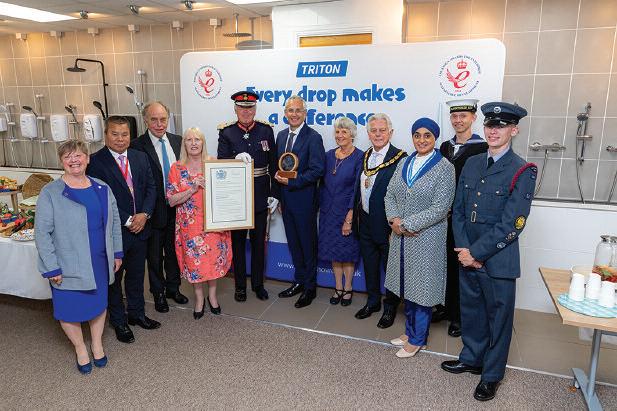


STORIES of a sea stranding and a cliffside rescue were recalled when several Teesside care homes raised hundreds of pounds for the Royal National Lifeboat Institution (RNLI) Care homes in Middlesbrough Stockton-onTees and Saltburn-by-the-Sea held a joint fundraising day as part on the lifeboat service’s 200 year anniversary
Residents, their families and staff from the Hill Care Group s Hazelgrove Court Care Home The Beeches Care Home and The Gables Care Home came together for the day of nautical-themed activities and games
Among them was David Rigg 75, from Hazelgrove Court who recalled his brother being rescued by the RNLI
He said: My brother Derek went out with a friend to fish in a small rowing boat when they were both about nine Unfortunately they lost their oars in the water and were stranded at sea so they had to be rescued by the RNLI
They both lived
Residents
In the afternoon entertainers the Von Johnsons performed and held a singalong to Sailor

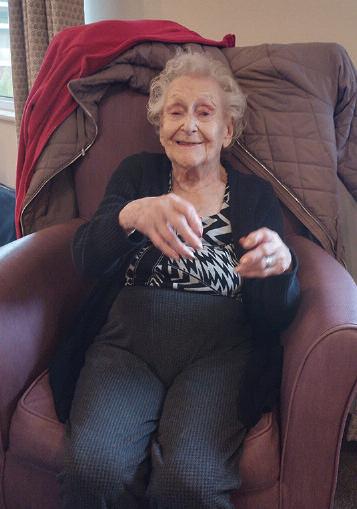
Earlier this month the Swindon and Wiltshire Innovative Technology Care Hub (SWITCH) held a training day for local Care Professionals working through Curam, the UK’s largest digital employment platform for the care sector to upskill and improve care provision in the region Care Professionals who work through Curam from Wiltshire Gloucestershire Hampshire Oxfordshire and Berkshire attended SWITCH s three-hour Wound Care training session achieving a collegelevel certification at the end of the day During the course, Care Professionals learnt about skin integrity and how to spot changes such as pressure wounds, as well as the initial response required to prevent infection whether that is basic treatment or referral
Using realistic task trainers in SWITCH’s interactive learning suite Care Professionals were given an accurate and bespoke sense of what wounds may look like on their clients and how they should react The session highlighted how skin wounds manifest on different skin types to instil cultural competency

and pan and
sweeping after the party had finished
want to thank everyone for their support in helping us smash the target of cards we needed and feel very privileged

The immersive suite at SWITCH simulates healthcare environments through projections, smells and a family of life-like manikins which can talk cough cry and realistically react to care interventions This helps Care Professionals develop healthcare skills and softer skills such as patient interaction in a simulation setting The hub was funded under the Skills Development Fund from the Department for Education SWITCH provides mandatory and clinical skills training to upskill care professionals across the region The session also acted as a networking opportunity allowing Care Professionals who work for Curam on a self-employed basis to come together as a team and share experiences and best practices
The initiative reflects Curam and SWITCH’s shared ethos of improving care provisions in the UK by ensuring everyone has access to high-quality care through upskilling and training and using technology to facilitate this
SWITCH aims to enhance and upskill health and social care workers in the area with cutting-edge technology-driven facilities and equipment in simulation hospital wards Augmented reality, virtual reality and manikins that have humanistic features and can react to the care given give Care Professionals hands-on experience and the opportunity to practice highrisk scenarios in low-pressure environments
Ashley-Louise Lumley a Swindon-based Curam Champion and organiser of the training day, said “SWITCH’s training


For 2025, Dulux is asking architects, specifiers and designers to embrace yellow and infuse a sense of optimism, pride and imagination into their projects As a guiding light to introduce these bold, positive shades to clients, the paint manufacturer has announced True Joy as its Colour of the Year for 2025, which is complemented by three versatile ColourFutures™ palettes
Over that last two decades, the Dulux Colour of the Year has been chosen through extensive trend research by Dulux colour experts and international design professionals The 2025 selection, True Joy™, is a bright and positive yellow that reflects people’s desire to break free, reset, and create something new and exciting As well as embracing True Joy™, Dulux is also encouraging designers to share the joy of yellow and help clients to leap out of their comfort zone - and feel confident in doing so
Yellow shades like True Joy™ can be used as a bold statement colour or an accent hue However, to help designers advise their clients on the best colour pairings, Dulux has created three supporting ColourFutures™ palettes
● Bold Colour Story: Inspired by the thrill of adventure, these bold colours bring spontaneity and energy to any space Bright blues and oranges contrast beautifully with accent yellow, making them ideal for educational and office environments where inspiration and creativity are key

● Human Colour Story: Celebrating artisanal craftsmanship, these shades of wood and clay reflect the raw materials used in handmade processes Perfect for educational and healthcare settings, these colours add a touch of authenticity and warmth
● Proud Colour Story: Drawing inspiration from diverse cultures around the world, these deep, rich and earthy browns and greens celebrate the rich heritages that make us unique Ideal for hospitality and residential spaces, they create a welcoming atmosphere where everyone feels at home

Dawn Scott, Dulux Trade Senior Colour Designer, said: “True Joy™ and its accompanying palettes offer a fresh perspective on colour's role in shaping our built environment These colours are not just trends but tools for architects and specifiers to craft spaces that resonate with the values and visions of their clients, improving our experience within the spaces we inhabit
“One of the most impactful applications of True Joy™ is within healthcare environments Paired with the earthy, natural shades of our Human Colour Story, True Joy can transform waiting rooms, corridors, and communal areas into uplifting and calming spaces This combination not only brightens the atmosphere but also connects patients and staff to a sense of warmth, creativity, and well-being ”
Marianne Shillingford, Creative Director and Colour Expert at Dulux, explains: “It may be difficult to
immediately picture where yellow paint could seamlessly slot into your home, but it’s actually much more versatile than you may first think The decision to choose the most uplifting hue in the spectrum is to spark inspiration and instil confidence to leap into the unknown and endless possibilities of what could be Whilst yellow is one of the bolder colours on the spectrum, True Joy™ is complementary to a vast range of palettes, it brings out the positivity in even the most neutral of shades and is the figurative glue that binds more daring colour stories together ”
To support specifiers and provide additional guidance on the use of True Joy™, Dulux has created the Dulux Trade Colour of the Year 2025 Specifier Guide which includes mood boards that can be used to help create the perfect space across any sector Architects, specifiers, and designers can also use the Dulux Trade Colour Schemer for colour inspiration or to create specifications for projects They can also speak with the Dulux Commercial Colour Services team for additional advice on how to use the Colour of the Year 2025

Dulux is proud of its ongoing efforts to produce durable solutions in a more sustainable manner By focusing on reducing carbon emissions and increasing the circular use of materials, Dulux ensures that products like True Joy not only enhance spaces aesthetically but also contribute to a greener future With initiatives such as using up to 70% recycled content in packaging and developing water-based paints with lower VOC content, Dulux is dedicated to helping professionals create beautiful, sustainable environments
Dulux Colour of the Year 2025 True Joy™ and the accompanying palettes will be available for purchase from10 September 2024
For more information, visit duluxtrade.co.uk/cf25 and follow #CF25 on social media

Leading figures and organisations across the adult social care sector have reacted to this week s Skills for Care Report which reveals huge challenges in recruiting and retaining staff, and are calling on the Government to take immediate and decisive action to tackle the adult social care workforce crisis
The report shows extensive staffing shortages increasing reliance on costly agency workers and growing financial pressures on councils Furthermore staffing shortages have a extremely negative impact on people who draw on care and support leaving an enormous amount of unmet and under met need across the country
SAM MONAGHAN, CHIEF EXECUTIVE AT MHA SAID: The new Skills for Care data shows steps in the right direction, but there is big hill to climb in maintaining a sustainable workforce for social care

With the launch of the Employment Rights Bill today, we welcome any measures on fair pay that lead to better recognition for the skilled and dedicated professionals working in care
MHA has long been calling for care worker pay to be increased However we are clear that any agreement on minimum pay or uplifts for care workers must come with additional funding in order for the sector to meet the increased pay commitment
MHA has not been immune to the care workforce pressures and we have been doing everything we can to address these issues This includes continuing to be a Real Living Wage employer since 2018, using innovative recruitment techniques as well as increasing overseas recruitment
“ We need to value our care colleagues in order to deliver high quality care and support that so many older people are in need of now and prepare for a future where there will be greater demand
KATHRYN SMITH, CHIEF EXECUTIVE OF THE SOCIAL CARE INSTITUTE FOR EXCELLENCE (SCIE) SAID: “The social care workforce remains in critical condition The reprieve brought by the record level of international recruitment has been much needed but ultimately not enough to stabilise the sector which contributes £68 1 billion annually to our economy
Domestic recruitment and retention are still at a crisis point with the number of British workers decreasing by around 70 000 over the last two years and the turnover rate for care workers at 41 1% “The decrease in the number of personal assistants is a significant concern due to the crucial role they play in providing personalised support The continued reduction could limit options for those requiring care, resulting in unmet needs Combined with the wider workforce pressures it highlights that people who employ personal assistants must not be left behind as part of government reform measures
With a vacancy rate that is three times that of the wider economy we urge the Government to take bold decisive action to tackle the workforce s short-term and long-term needs This includes addressing low pay which remains a significant issue as well as improved employment contracts better working conditions career development and training opportunities
“The roadmap described in the Skills for Care Workforce Strategy provides a springboard for action By valuing and rewarding the care workforce we will ensure a better future for the care system for both the people who work in it and those who rely on it daily ” HEAD OF PRACTICE AND WORKFORCE AT THE ROYAL COLLEGE OF OCCUPATIONAL THERAPISTS, SUHAILAH MOHAMED, SAID: ‘Recruitment can be tricky in all areas of social care, and we must do more to make a career in social care more attractive We especially need to grow our own workforce and better support those who have chosen to work in our social care services from abroad One way in which this could be done is to highlight the wide variety of careers within the social care sector which includes occupational therapy
On the eve of its first 100 days in office the UK government needs to recognise the key role occupational therapists play in social care There currently aren t enough occupational therapists in the community to provide the support that people need to do essential daily occupations such as getting in and out of bed dressing bathing and preparing meals With the right support for people at home there would be less pressure on an already-stretched healthcare service and workforce, saving money and reducing waiting lists
Investment in the social care workforce is critical More investment and a more targeted focus on recruitment and retention would mean we could help the people accessing social care services manage their health and daily living as well as supporting them to live in homes that are safe and enable them to live quality lives ’
VIC RAYNER OBE, CEO OF NCF SAID: “While the data presented in this report shows a welcome stabilisation of some of the key metrics around the care workforce we must not underestimate the role of international recruitment and the mammoth efforts of providers to improve pay terms and conditions
It is important to recognise the dedicated international colleagues who have chosen to come to the UK to provide care and support to people who need it when there are so many other countries across the world crying out for care staff However when the impact of international recruitment is stripped out the underlying statistics around pay, turnover and recruitment make clear that we are not in a sustainable situation, and we need a long-term solution to these systemic workforce issues
“This is driven home when one considers that there are now 70 000 fewer British workers in direct care roles compared to 2021/22 In the same period there was an increase of 185 000 international recruits
The solutions to this domestic workforce crisis are in plain sight as presented in a workforce strategy for

adult social care facilitated by Skills for Care and published in July 2024
This strategy was developed in collaboration with a wide range of organisations, including NCF representatives of our membership and people with a stake in the future of care services We call on the government to adopt, and fully fund, the strategy with urgency as it presents clear and deliverable methods that would create meaningful and sustainable change We reiterate our offer to work together with the government as it develops its Fair Pay Agreement for care workers and a National Care Service – central to this will be the implementation of an actionable plan to ensure good quality, sustainable care is there when people need it most
DANNY MORTIMER, CHIEF EXECUTIVE OF NHS EMPLOYERS, SAID:
Health leaders will be concerned by these figures which continue to show worrying trends in how competitive social care pay and terms are in the labour market and the risk that the care sector s growing reliance on international recruitment and its global workforce is undermined by changes in migration policy
Social care staff from overseas play an increasingly vital role in social care services and contribute valuable skills and knowledge However as these figures highlight we are headed for cliff edge in the social care workforce in the years to come as both domestic and international workforce numbers dwindle and the number of people who need vital social care support surges
“The social care and health sectors are sister services both focused on improving the health of the communities they serve We acknowledge that the new government have made a number of important commitments regarding fair pay for the social care workforce
However there is a need to go further and the recent Skills for Care Workforce Strategy sets out a series of steps and actions which we urge the government to also support and implement ”
CURRY SAID: This latest report again highlights the sheer size and immense societal and economic value of England’s social care sector which employs nearly 1 6 million people in crucial caring roles and contributes more than £68bn to the English economy But despite its value the sector remains in peril and today’s outlook must serve as a wake-up call for government to get to grips with the future of social care
The average vacancy rate in social care is still nearly three times higher than the national workforce average and concerningly care worker pay remains among the lowest in the economy with 80% of jobs paying more Meanwhile the sector s necessary dependence on international recruitment looks increasingly fragile as the number of applications from workers overseas has fallen dramatically over recent months, likely accelerated by visa changes
“The sector will need another 540,000 workers by 2040 to keep up with need Shoring up its workforce with overseas recruits is not a sustainable solution and the government needs to act now on the issue Skills for Care s existing workforce strategy is a great place to start – government needs to urgently fund and support that strategy working closely with the sector and stakeholders to join up the dots on workforce development pay and wider service improvement and integration to ensure we have a social care sector fit for the future ”
LUCINDA ALLEN, SENIOR POLICY OFFICER AT THE HEALTH FOUNDATION, SAID: Today s data show that staffing shortages in the care sector have recovered from a crisis point in 2021 largely thanks to record levels of international recruitment But ensuring enough staff to care for older and disabled people remains challenging, with 131,000 unfilled posts in social care in 2023/24 and a vacancy rate almost three times that of the wider UK economy The significant drop in international recruitment in recent months may spell more trouble ahead
The government s forthcoming legislation on a fair pay agreement to set minimum pay terms and conditions in social care is promising Boosting pay is a necessary step to make the sector more attractive, but evidence suggests that pay policies work better when there s also improvements to progression training and development Alongside the fair pay agreement the government needs to set out a comprehensive workforce strategy for social care
The social care system also desperately needs wider reform and investment including to improve people’s care and protect people against high care costs Nearly 100 days into the new government, there is still no sign of a desperately needed plan for social care Without this the government s aspiration of a national care service’ risks being added to the long list of broken political promises on social care
CLLR DAVID FOTHERGILL, CHAIR OF THE LGA’S COMMUNITY WELLBEING BOARD, SAID: The adult social care workforce plays an essential role in supporting people of all ages to live full, independent lives But this sector is at breaking point with vacancies turnover and low pay creating growing pressures that have led to a significant amount of unmet and under-met need
Without urgent intervention councils will struggle to meet their legal duties to people who draw on care
We are calling on the Government to work quickly and closely with councils on a fair pay agreement for care workers to attract and retain skilled professionals implementing a fully funded workforce strategy for the sector and providing councils with the resources they need to reduce their reliance on costly agency staff
This is vital for building a sustainable adult social care workforce that can continue to provide high-quality care This workforce crisis requires urgent attention and cross-party collaboration We are urging all political parties to put the national interest first and work together to secure the future of adult social care
A key crisis support service for older people provided by Bristolbased charity Brunelcare is under threat, following a proposal to withdraw its funding
The Help When You Need It service is available to all of Brunelcare s 900 sheltered housing residents living across the city and is currently funded by Bristol City Council
It provides vital support to elderly and vulnerable residents including those who are at risk of not being able to sustain their tenancies residents who require additional support during and following a hospital admission and others struggling with a wide range of crises including poor mental and physical health, poverty and social isolation
The Council is proposing to withdraw funding for the service at the end of the current contract in March 2025 as part of wider savings being considered within its Adult Social Care budget This proposal would save the Council £200 000 a small fraction of the overall savings it is aiming to make within adult social care A public consultation on the proposal closed on 17 September, and the final decision is due to be made later this month

Oona Goldsworthy Chief Executive of Brunelcare said: We urge the Council to reconsider the proposal to end this service for vulnerable older people We see the huge benefits this service provides to those we support and in many cases transform their quality of life
“The service also results in substantial annual savings for the Council and NHS In Bristol more than 500 households approach the Council each month because of homelessness related issues We fear that without the support of this service it is likely that more vulnerable people will be unable to sustain their tenancies and will require assistance from the Council’s own housing and homelessness team at a considerably
higher overall cost to the Council and the NHS Brunelcare has provided this service since 2021, and over this time we have also seen our clients needs and the demands on the service grow in complexity This is mainly due to the change in needs of residents who are nominated to Sheltered Housing with a significant percentage presenting with mental and physical ill health as well as a history of homelessness and substance abuse
Anthony a Brunelcare sheltered housing resident who has received support from the HWYNI service said: I suffer from Chronic Obstructive Pulmonary Disease (COPD) and use oxygen to help me breathe I was struggling to look after myself and my property, which had become very overcrowded and cluttered with possessions My physical and mental health started to decline I was in and out of hospital on a regular basis and I was at risk of losing my tenancy because of the poor condition of my property
“I was assigned a Health and Wellbeing Officer from the team, and they have made a huge difference in getting me back on track With their support I was able to declutter my flat enough to live there safely and happily I was still struggling to get up the stairs to my flat, so when a more appropriate ground floor flat became available on my site the team supported me to make the move which has improved my situation even further ”
A decision on the proposal regarding the future of this service is due to be made by members of the Council s Adult Social Care Policy Committee on 21 October Brunelcare staff and residents who have been supported by the service will be attending the meeting to raise their concerns in person

Knight Frank, the leading independent global property consultancy, has hosted a record-breaking Healthcare Property Lunch raising £65 000 for healthcare charities and bringing together leading investors, advisors and operators from key global markets
The event held on 3 October at the London Marriott Grosvenor Square celebrated excellence in the sector and brought together industry leaders to discuss the outlook for 2025 Participants in a UK Healthcare Industry Leaders panel included Andrea Auteri (Co-Founder Elevation Advisors) Justin Ash (CEO Spire Healthcare Group plc), Pete Calveley (CEO, Barchester Healthcare) and Rebecca Pearson (General Manager Bupa) with Justin Hutchens (Executive Vice President Ventas Inc ) Steve Nitschke (Managing Director of UK/European Acquisitions Medical Properties Trust Inc Trust) Stefaan Gielens (Chief Executive Officer Aedifica NV/SA) joining a discussion on the changing dynamics across key global markets THE EVENT ALSO INCLUDED THE ANNOUNCEMENT OF THE WINNERS OF


Photo Caption Left – Wigan and Leigh Hospice Practice Educator Monica
McCahery, with Richmond House Home Manager Lorraine
Scholey Right – Richmond House Deputy Home Manager Dean Bent with his award
Richmond House won Home of the Year award while Lorraine Scholey Home Manager won a ‘Special Recognition award and Dean Bent won the Deputy Manager of the Year’ award
The awards ceremony took place on Friday October 11 at Leigh Sports Village in Leigh, Greater Manchester This event showcases and celebrates all of the
IN TOTAL, RICHMOND HOUSE WERE SHORTLISTED FOR FIVE AWARDS THIS YEAR, AND WERE OVER THE MOON WITH THE FOLLOWING NOMINATIONS:
•
• Dean Bent – Deputy Manager of the Year
Lorraine Scholey – Special Recognition Award
Commenting on her win, Richmond House Home
Manager Lorraine Scholey said:
“I was so pleased to win this award, I have dedicated the last 30 years of my career to Richmond House so to receive recognition for this was just so overwhelming ”
Dean Bent Deputy Home Manager at Richmond House stated I was thrilled to win this award for a second time the evening was a great success celebrating everyone’s hard work and dedication across the Wigan borough
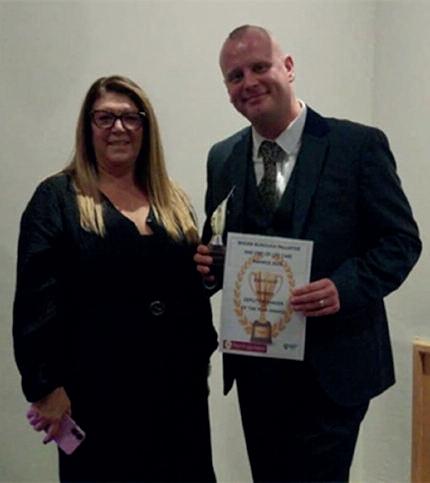
The Cleaning & Hygiene Suppliers Association has launched a campaign designed to spread the word about the importance of regulations when buying cleaning and hygiene chemicals
Compliance with formal UK Government European Union and industry-standard regulations is essential if buyers are to be certain product claims are legitimate and proven Adherence to regulations guarantee safety They underpin transparency and ensure consistency They support buyers informed decision making by providing a framework for comparison so a buyer really knows if they are getting the product or solution they need They also provide accountability giving buyers a route to recourse if needed In short they underwrite an ethical
approach
Buyers and end users can also turn to regulations to be certain they are not misled by environmental claims in the rush toward sustainable solutions
Lorcan Mekitarian Chair of the Cleaning & Hygiene Suppliers Association said: Buyers and end users need to be able to trust the product and sales and marketing claims They need to be certain of the balance between efficacy and sustainability and they need to make sure they are using the right product for the job in hand They are not chemists however so may be misled by seductive sales and marketing messaging

“Our advice is to talk to your manufacturer and ask for evidence to support their claims This will come in the form of their technical data sheets, third party verifications and certifications and, importantly, proof of regulatory compliance ” Gobble-de-gook or undefined phrases to be wary of include: ‘non-renewable chemicals’ ‘chemical-free’ ‘natural’ ‘five times filtered water’ and ‘non-toxic’ ‘Biodegradable’ is also a confusing term As applied to cleaning products it is defined in current legislation (Detergent Regulation (EC) No 648/2004 and corresponding UK post Brexit legislation)
Something claiming to be organic should be certified by for example the Soil Association Net-zero claims should be based on the international net-zero standard (https://sciencebasedtargets org/net-zero) or another reliable third party verified certification
Every member of the CHSA has signed our rigorous Code of Practice, which demands our members trade ethically Amongst other stipulations it requires members to: conduct business dealings in an open honest fair and proper manner and in accordance with the laws rules and regulations of the UK and EU ensure all public statements made by and on behalf of the Member are decent honest and truthful ensure no false or exaggerated claims are made verbally in literature electronically or in any other way • hold and provide evidence on request for product and service claims particularly with reference to legislation certifications and accreditations
The CHSA Code of Practice also includes the Competition & Market’s Authority’s Green Claims Code Its principles are summarised as: Claims must be truthful and accurate
Claims must be clear and unambiguous
Claims must not omit or hide important relevant information
Comparisons must be fair and meaningful
Claims must consider the full life cycle of the product or service
Claims must be substantiated
Finally every member of the CHSA s Accreditation Scheme for manufacturers of cleaning chemicals has signed the CHSA s own ethical marketing code
@CHSACleaning www CHSA co uk




mk-hire co uk See the advert on page 19

MOWOOT II – proven solution to chronic constipation without medication
Developed by a team of doctors and other healthcare professionals, MOWOOT II performs gentle abdominal massage to speed up intestinal passage in people experiencing chronic constipation
Clinically proven safe and effective relaxing and sideeffects free MOWOOT II
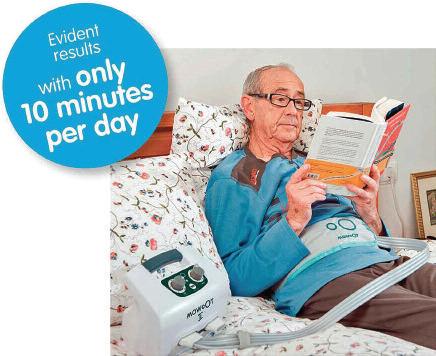
Abdominal Massage Therapy System combats constipation and provides soothing relief to affected people
Easy to use and comfortable the MOWOOT II treats and manages constipation in people with spinal cord injuries multiple sclerosis sufferers Parkinson’s Disease patients and people with constipation related to prescription medication MOWOOT II also helps to relieve idiopathic constipation experienced by menopausal and post-menopausal women

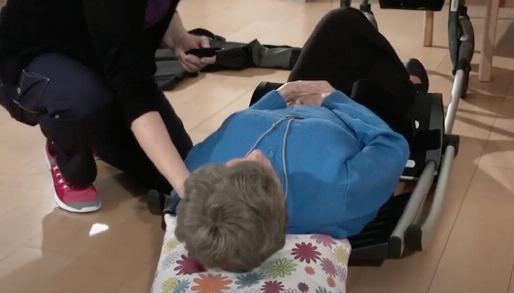
and older and elderly people In clinical studies
MOWOOT II increased evacuation frequency softened stools, improved regularity, reduced gasses relieved bloating and eased off abdominal discomfort 10 to 20 minutes daily of relaxing abdominal massage with MOWOOT II rapidly reduces symptoms of constipation Evident results are experienced only a few days after the first treatment Regular abdominal massage with MOOWOOT II ensures lasting health benefits and better quality of life
MOWOOT II – effective solution to chronic constipation for better quality of life! Supplied



Our Integrity Static Cushions crafted with high-quality materials and innovative design are effective in preventing and managing pressure ulcers by redistributing pressure and minimising skin damage They feature a larger surface area that spreads the user's weight reducing pressure on specific points EasyGo patient lift and transfer chair addresses common issues found in traditional hoists which are often cumbersome and difficult to manoeuvre especially in tight spaces and require multiple staff members EasyGo simplifies the lifting and transferring process enhancing patient dignity and comfort It is designed to move between beds wheelchairs toilets and cars Additionally we have developed a patient transfer seat that can incorporate any Integrity Static Cushion providing optimal pressure relief during transfers

Pressure ulcers are largely preventable with the right approach Our goal is to make your job easier, allowing you to focus on exceptional care and improving residents' quality of life We offer comprehensive product training and support including inperson and online sessions detailed manuals quick-start guides and access to our support team for advice and updates on best practices in pressure ulcer prevention 01457 890 980 | sales@sumed co uk | www sumedinternational com See the advert on the back cover for further information
service

as well as curtains and offers a comprehensive range of shutters
Doug says: “We stock two ranges of silent gliss corded curtain tracks and two ranges of silent gliss uncorded curtain tracks the fitted prices for which are available on this website All of the aluminium silent gliss tracks stock can be shaped and fitted into bay windows, as can some of the poles We also have ready access to many more ranges of both tracks and poles, most of which we can get in one working day “To read more of what our customers say about us please do look us up on Checkatrade checkatrade com/mrtrax
Call now to speak to one of our team on 0800 3345114 or 07968 242004 email us at doug@mrtrax co uk or see the advert on page 8

NCCO International announces the launch of Task Manager an innovative food safety task management and temperature monitoring solution designed for the senior living and residential care home sector Task Manager addresses critical pain points in food safety compliance operational efficiency and resident satisfaction
Task Manager is a game-changer for the senior living industry said Karl Rose Managing Director of NCCO International, "Our system not only ensures compliance with food safety regulations but also enhances the quality of life for residents by guaranteeing safe and nutritious meals
Task Manager assists senior care facilities in adhering to local state, and federal food safety regulations aiming to reduce the risk of foodborne illnesses among elderly residents By providing detailed record-keeping and log management Task Manager supports facilities in maintaining audit readiness facilitating health inspections and compliance checks

Task Manager automates temperature monitoring for refrigerators freezers and food storage areas to help maintain safe limits without manual checks The system organizes food safety-related tasks, such as cleaning schedules equipment maintenance and staff training to help ensure thoroughness With consistent monitoring Task Manager helps maintain the nutritional value and quality of stored and prepared food Real-time alerts for temperature deviations enable quick corrective actions, potentially preventing spoilage and ensuring residents receive high-quality meals For more information about Task Manager please visit www ncco eu or contact David Webster at dwebster@ncco com

By

Malnutrition remains a significant issue in care homes where the elderly are particularly vulnerable As a registered dietitian working in the community and in hospital wards often with elderly people who have experienced fall, I wish more people knew about the prevalence of malnutrition and how to combat it before they ended up in hospital
Recent statistics paint a stark picture: Around one in 10 people over the age of 65 are malnourished or at risk of malnutrition and this figure rises alarmingly to 45% among those in their 90s According to the British Association for Parenteral and Enteral Nutrition (BAPEN) malnutrition costs the UK approximately £23 5 billion annually with older adults being disproportionately affected
As the population ages addressing malnutrition and its associated complications, such as frailty and sarcopenia, becomes ever more critical By focusing on early detection and strategic nutritional interventions, including the use of protein, care homes can play a vital role in safeguarding the health of their residents
SPOTTING THE EARLY SIGNS OF MALNUTRITION
The first step in combating malnutrition is recognizing its early signs
The Malnutrition Universal Screening Tool (MUST) is a valuable resource for this purpose enabling caregivers to systematically assess the risk of malnutrition in residents by considering factors such as Body Mass Index (BMI) unintentional weight loss and the impact of acute illness on nutritional intake
KEY EARLY SIGNS TO MONITOR:
1 Unintentional Weight Loss: A significant early indicator of malnutrition is unintentional weight loss Regularly monitoring residents' weight and comparing it to previous measurements is essential A loss of even 5% of body weight over a few months can signal malnutrition and warrants immediate attention
2 Decreased Appetite: A reduced appetite is often a precursor to malnutrition Residents may skip meals, eat smaller portions, or show a lack of interest in food It s important to understand the reasons behind these changes which could be linked to dental issues depression or medication side effects
3 Physical Changes: Signs such as muscle wasting thinning hair dry skin or dental problems may indicate nutritional deficiencies These physical symptoms are often subtle but crucial indicators of potential malnutrition
4 Fatigue and Weakness: Increased tiredness or difficulty performing daily activities can be related to inadequate nutrition This could also signal the onset of sarcopenia where the loss of muscle mass and strength makes everyday tasks increasingly challenging THE ROLE OF NUTRITION IN PREVENTING AND MANAGING FRAILTY
Frailty a condition characterized by decreased strength endurance and physiological function is closely linked to malnutrition and is a major concern in care homes Proper nutrition is key to preventing and managing frailty particularly through the adequate intake of protein which is essential for maintaining muscle mass and function STRATEGIES FOR NUTRITIONAL INTERVENTIONS:
1 Prioritize Whole Foods: Ensuring a diet rich in whole foods is foundational Protein-rich foods like eggs lean meats, fish, dairy products, and legumes should be emphasized as they not only support muscle
health but also provide essential vitamins and minerals that contribute to overall well-being
2 Incorporate Protein Supplements When Necessary: In cases where residents struggle to meet their protein needs through diet alone perhaps due to a lack of appetite or difficulty chewing protein powders or fortified drinks can be effective These supplements can be easily added to meals snacks or beverages ensuring that residents receive the protein they need without overwhelming them with large portions of food
3 Distribute Protein Throughout the Day: Research shows that distributing protein intake evenly across all meals is more effective for muscle protein synthesis than consuming large amounts at a single meal Caregivers should ensure that residents receive adequate protein at breakfast lunch and dinner to maximize the benefits for muscle maintenance and frailty prevention
ADDRESSING BARRIERS TO ADEQUATE NUTRITION
While boosting protein intake is essential we should also address the barriers that may prevent residents from consuming enough nutrients Factors such as taste preferences difficulties with swallowing, or digestive issues can all impact nutritional intake Caregivers should work closely with dietitians to develop personalized nutrition plans that accommodate these challenges potentially incorporating protein powders and other supplements in palatable and easy-to-digest forms NUTRITION IS KEY TO INCREASING HEALTHSPAN
Malnutrition in care homes is a pressing issue that requires vigilant monitoring and proactive management While the numbers alone tell us the stakes are high intervention is more than about reducing costs The ability to stand up from a chair unaided allows our elderly residents independence By spotting the early signs of malnutrition and implementing strategic nutritional interventions, caregivers can help prevent and manage frailty significantly improving the quality of life for residents By addressing malnutrition and frailty head-on care homes can help residents not only avoid the adverse effects of these conditions but also thrive in their later years

WHAT IS DYSPHAGIA?
Dysphagia is a medical condition that makes swallowing food and drink more difficult Depending on the severity some textures may be more difficult to swallow or somebody may have lost the ability to swallow at all Regardless this can make mealtimes much more difficult, which is why care home caterers must know about this condition and how to support those who have it
A few conditions can cause dysphagia including cancer head injuries a stroke or dementia Age can also play a role in developing this condition meaning there could be a higher likelihood of some residents suffering from this EFFECTS OF DYSPHAGIA
Dysphagia doesn’t just affect mealtimes – it can also: Impact on quality of life: If somebody is no longer able to eat and drink as they ve been able to they may become withdrawn and develop a low mood The change can be difficult to get to grips with which is why supporting residents through their dietary transition and making sure they’re properly catered for is so important
Lead to malnutrition and dehydration: A lack of food and drink due to not being able to swallow or chew properly can mean that residents aren’t properly hydrated or receiving enough nutrition This can result in lower energy levels and in more extreme cases can also lead to further health complications
• Cause choking: Without specialist catering somebody with dysphagia may not be able to swallow their food which can be a choking hazard
FRAMEWORK?
By Rob Henry,
Head of Culinary Solutions and Compliance at EF Group (www ef- group co uk)
dysphagia who have trouble chewing and swallowing Using this framework caterers in the care industry can determine which foods and drinks would be easiest for people with this condition to consume IDDSI consists of eight levels ranging from 0 to 7 with drinks ranging from 0 (thin) to 4 (extremely thick) and foods ranging from 3 (liquidised) to 7 (regular and easy to chew) These indicate the texture and thickness of foods and drinks and give some steer as to which ones would be safest for somebody with dysphagia to consume
ADDITIONAL CONSIDERATIONS FOR CATERING TO
DYSPHAGIA
When you’re preparing to cater for residents with dysphagia there are a few extra things you might need to consider These include:
Training your staff on the IDDSI framework: Ensuring your staff understand the framework what it means and how to apply it is crucial Holding training sessions on this can make sure everybody is on the same page when it comes to catering to the needs of residents with dysphagia
Knowing when to modify the menu to resident needs: Once your team are trained on the IDDSI framework, this must be implemented into your catering practices This should involve assessing each resident’s dietary needs to see if they require modifications and monitoring this over time in case further changes are needed
Getting in the correct nutrients and fluids Alongside modifying diets based on what is easiest for residents to consume you should be ensuring all residents are properly hydrated and receiving a balanced and nutritious diet Whether their food is liquidised, regular or somewhere in between hydration and nutrition must never be reduced even though you might need to alter the way these are offered to residents
Making mealtimes more enjoyable: If somebody has been living with dysphagia without a modified diet they may need some extra encouragement at mealtimes once the modifications have been made Try making mealtimes social introducing different flavours or recipes and regularly rotating menu options to keep them interested and more likely to finish their food
Supporting residents with dysphagia is a key duty of caterers in the care industry and can have a huge impact on their wellbeing, health and quality of life Therefore, it’s vital that your catering team are aware of the signs of the condition and how the IDDSI framework can be used to prescribe a better approach to their mealtimes

Food procurement specialists allmanhall, explore the importance of nutrition and hydration in older people specifically considered for a dignified and person-centric dining experience
Proper nutrition and hydration are critical in care homes directly impacting the health wellbeing and overall quality of life for residents Research by BAPEN reveals that malnutrition affects 35% of care home residents in the UK leading to a variety of health issues including increased infections, poor wound healing mental health decline social isolation and increased frailty This underlines the need for a comprehensive person-centric approach to food and drink in these environments
As people age the risks of malnutrition and dehydration increase compounded by the natural decline in thirst reflex and in some cases cognitive impairments such as dementia These factors make it challenging for older individuals to maintain adequate nutrition and hydration Therefore it s crucial that care home staff adopt a dignified approach to meals, recognising that the involvement in making choices about food remains important even when other capacities are diminished

At a recent National Association of Care Catering (NACC) Seminar care professionals emphasised the significance of creating a positive mealtime experience Engaging residents in conversations about their food preferences understanding their personal histories and ensuring that texture-modified meals are both nutritious and appealing are vital steps in enhancing mealtime satisfaction
Hydration is equally important playing a key role in bodily functions and the prevention of conditions like urinary tract infections and chronic renal disease Strategies to encourage fluid intake include offering a
variety of beverages, promoting "hydration hour" with mocktails, and providing high-fluid-content foods like soups and yogurts It s also important to educate care home staff on recognising signs of dehydration which can manifest as tiredness headaches and poor concentration
Nutritionally care homes should focus on nutrient-dense foods rather than calorie-dense ones Incorporating ingredients like eggs seeds, and Greek yogurt can help ensure that residents receive essential nutrients Additionally increasing dietary fibre through foods like whole grains, legumes, and unpeeled fruits can support digestive health and reduce the risk of conditions such as diabetes and heart disease It's important however to introduce fibre gradually to avoid digestive discomfort
For residents with dysphagia a condition that impairs swallowing care homes must offer texture-modified diets that are both safe and nutritious Providing adequate training for staff on preparing these meals, ensuring that they are nutritionally fortified, and enhancing flavours with herbs and spices can make these meals more enjoyable for residents
In conclusion providing a holistic person-centric dining experience in care homes is essential for maintaining the health and dignity of residents By focusing on nutrition hydration and individual preferences care homes can significantly enhance the quality of life for their residents
The mealtime experience is so much more than just food Care establishments across the UK are partnering with allmanhall to manage their food procurement achieve savings and improvements and to access support to enhance the overall dining experience Get in touch – hello@allmanhall co uk
no-melt formula resulting in shelf-stable ice cream products that can be enjoyed by everyone SCREAMIES ice-scream also never gets softer than IDDSI Level 4 making it the perfect treat for those with dysphagia

market
Launched in 2016 SCREAMIES is a brand with one purpose: to deliver the taste of sumptuous old-fashioned ice cream and make it accessible to everyone Each SCREAMIES product is created with a spe-
As well as the traditional three flavours Screamies offers Chocolate and Salted Caramel with added Protein for those with additional nutritional needs With a long shelf life Screamies can be stored at ambient temperature and frozen when the time suits Flavour Creations also offer a wide range of market leading supporting products for those looking to provide something extra to patients Pre-thickened Ready to Drink ranges include in excess of 20 flavour profiles Advital nutritionally complete powder comes flavoured and neutral and is used in snacks like Advital chocolate mousse and Fruits with Attitude Flavour Creations also supply high quality moulds and Shape It to assist with food preparation at all IDDSI levels
To find out more simply contact Albany Products at enquiries@albanyproducts co uk or call on 01706


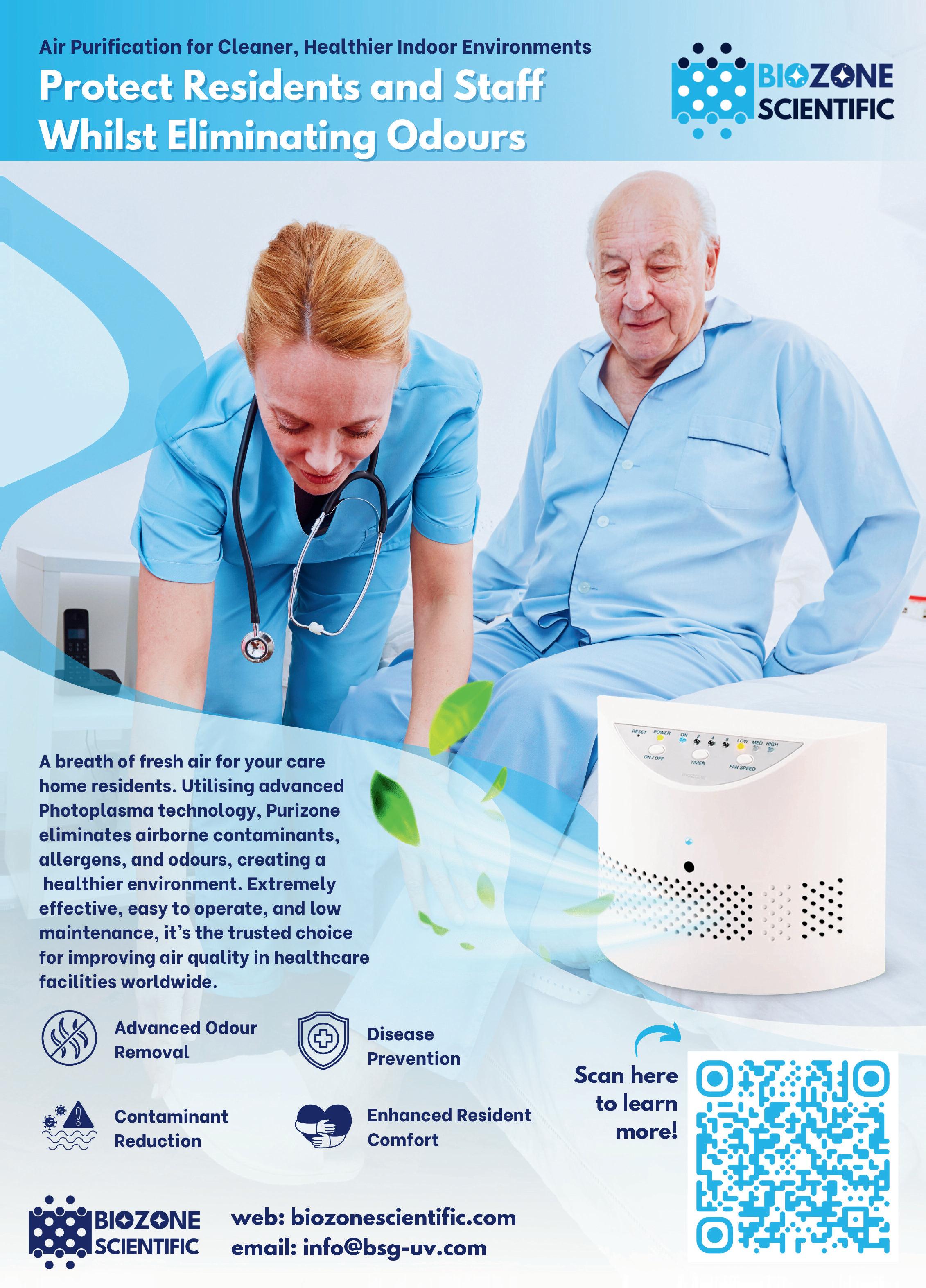



Oxy-Gen
This
Oxy-Gen
All
Carbon
With
See






When




By Scott Williamson, Managing Director,

In the ever-changing and often demanding environment of residential and nursing care homes prioritising the well-being of residents is paramount As care providers it is imperative to explore innovative methods to enhance the quality of life for those in care especially individuals living with cognitive impairments such as dementia One highly impactful method embraced in recent years is sensory stimulation a comprehensive approach that enhances physical, emotional, and cognitive well-being With the integration of advanced AI technology, newer technologies such as personalised, relaxing music videos breathe new life into old black-and-white photos by colourising them accompanied by soothing music captivating landscape visuals and cherished family photos or video messages This provides a distinctive way to deliver a holistic, sensory-enriched experience that significantly benefits elderly residents and those with dementia
DIVERSE FORMS OF SENSORY EXPERIENCES
There are many ways to incorporate sensory experiences into daily care each offering unique benefits for residents
1 Visual Stimulation: Personalised relaxing music videos use serene natural landscapes and family memories to captivate residents' visual senses These familiar images, paired with scenic backdrops evoke positive emotions and comfort Advanced technologies such as AI-powered colourisation of old black-and-white photos bring memories of the past to life enriching the experience further by reconnecting residents with their personal history
2 Auditory Stimulation: The choice of music in these videos is key Rather than familiar music that may evoke specific emotions or memories soothing and non-intrusive sounds are purposefully chosen to enhance deep relaxation and open the senses to help immerse themselves in the visuals and relax without the distraction of nostalgia, allowing for a more profound sensory experience
3 Tactile Stimulation: Personalised videos can be paired with tactile activities to further engage residents Watching these calming visuals while interacting with textured objects fidget blankets or engaging in simple activities like handling soft fabrics can provide enhanced comfort and sensory richness
4 Olfactory Stimulation: While videos alone do not engage the sense of smell pairing them with aromatherapy sessions using calming scents like lavender or invigorating fragrances like citrus can amplify the relaxation experience making it more immersive and holistic
5 Gustatory Stimulation: Taste experiences can also complement sensory videos For example, while watching

THE
personalised landscapes or family-themed videos, residents can engage in taste sessions, trying familiar and comforting flavours adding another dimension to the sensory experience
The implementation of sensory stimulation has wide-reaching benefits that can positively impact residents' emotional, psychological, and physical health Regular sensory activities offer the following advantages:
- Reduction in Agitation and Restlessness: Especially for residents with dementia, these videos create a sense of familiarity and calm reducing anxiety and behavioural issues
- Improved Cognitive Function: Engaging residents’ brains through visual and auditory stimuli helps maintain and in some cases improve cognitive abilities providing meaningful engagement
- Enhanced Communication: Residents who struggle with verbal communication often respond emotionally or cognitively to visual and auditory cues Personalised videos offer alternative ways for residents to express themselves facilitating greater interaction
- Increased Social Interaction: When shared in group settings, these videos encourage social engagement, helping reduce feelings of isolation and loneliness
SENSORY STIMULATION FOR DEMENTIA PATIENTS
For dementia patients sensory stimulation plays a particularly important role in their care Personalised videos offer structure, evoke memories, and facilitate moments of connection between residents and caregivers or family members Combining these videos with other sensory activities such as memory boxes filled with personal items can deepen the experience, triggering memories and meaningful conversation
CREATING SENSORY ROOMS IN CARE HOMES
Many care homes have found success in creating dedicated sensory rooms Personalised relaxing music videos are ideal for use in these spaces where they can be combined with soft lighting calming scents and tactile objects to offer a fully immersive environment These sensory rooms provide a tranquil retreat for residents allowing them to engage multiple senses in a way that is soothing and beneficial
THE POWER OF VISUAL LANDSCAPES FOR SENSORY STIMULATION
Visual landscapes such as nature scenes are an invaluable tool for sensory stimulation For residents who may no longer be able to experience the outdoors firsthand, these videos offer a powerful connection to the natural world Scenes of oceans forests or mountain views have been shown to reduce anxiety alleviate stress and promote mental well-being The immersive quality of these visuals when combined with soothing music provides a window to the outside world offering comfort and emotional enrichment for residents who may feel disconnected from nature
AI TRANSFORMING RESIDENT CARE
The integration of AI into sensory stimulation is revolutionising how care homes approach resident wellbeing AI technologies such as the colourisation of old photographs help residents reconnect with their past in vivid detail These enhanced visuals combined with calming music and personal video messages from loved ones create a multi-sensory experience that reduces anxiety and promotes emotional well-being This innovative use of AI not only improves the sensory experience but also strengthens cognitive function making it an essential tool in modern care homes
THE VALUE OF PHOTOS AND VIDEO MESSAGES FROM LOVED ONES
Incorporating photos and video messages from loved ones adds an emotional layer to sensory stimulation Seeing familiar faces and hearing the voices of family members triggers emotional recognition which can provide comfort and reduce anxiety especially for those experiencing memory loss This personalised approach creates meaningful connections stimulating both visual and auditory pathways and offering moments of joy and clarity for residents
Moreover video messages combat feelings of loneliness and isolation Residents feel a stronger sense of belonging and connection to their loved ones, even if they cannot be physically present This can significantly enhance their overall well-being contributing to a more enriching care environment
SENSORY
Sensory therapy particularly 30-minute video experiences serves as a versatile tool for structured activities With the ability to loop the videos for longer experiences caregivers can find moments of respite while enhancing the well-being of residents Creating a calm and engaged environment through sensory videos can improve the caregiving experience and reduce caregiver burnout
CONCLUSION
The integration of sensory stimulation, particularly through personalised AI-enhanced relaxing music videos offers a transformative approach to improving the well-being of residents in care homes By engaging multiple senses including visual, auditory, tactile, olfactory, and even gustatory, these videos provide a holistic and enriching experience that benefits both residents and caregivers For individuals living with cognitive impairments like dementia these sensory experiences evoke memories reduce anxiety and foster emotional connections
The use of advanced AI technologies such as the colourisation of old photos combined with serene landscapes, soothing music, and messages from loved ones, adds a deeply personal and meaningful dimension to the care environment The implementation of sensory rooms and dedicated sensory activities not only enhances residents' physical and emotional health but also offers caregivers a valuable tool for creating a calm structured environment As care homes continue to evolve embracing sensory therapies will remain essential in promoting a higher quality of life for elderly residents and those living with dementia



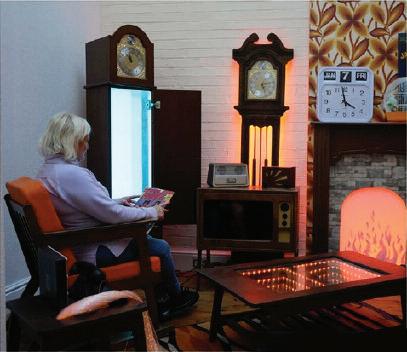



Increase
Improve
Deliver

PASS
Visibility of allergies vaccinations and medications especially useful for clients unable to reliably share their personal information
• Using medical information to inform care planning
Ensuring that the right medication is delivered to the right person in the timeliest manner In one case this allowed the administration of antibiotics on a Friday evening aiding the service user’s swift recovery from infection
Available to all PASS users at no additional cost PASS GP Connect is significantly more efficient than waiting for a GP response It’s also a positive step forward on the path to the DHSC s goal for widespread digitally enabled care and is in full alignment with their ambition for joined up care for everyone
Get in touch: www everylifetechnologies com hello@everylifetechnologies com
The job of a care worker though immensely rewarding is not without its challenges A growing demand for social care has seen carers placed under greater strain, with a mounting workload and limited resources
Increasingly, carers are also exposed to abusive and even violent behaviour from service users and their relatives Be it deliberate or as often the case unintentional Such aggression can leave a profound mark on diligent and dedicated care staff

The solution to many a modern-day problem is often tech and so too is this the case when dealing with today s care landscape STAFF ALARM SYSTEMS
Tech has proven to be a friend to the care worker automating administrative tasks, enhancing reporting and, in the case of staff alarm systems protecting them from potential harm What was originally a bell to alert colleagues to the need for assistance has become far more sophisticated The modern safety alarm is discreet can be easily attached – if not part of – the wearer’s uniform It is supremely efficient and designed with the accuracy to pinpoint the exact location of an active call in a ward of over 80 rooms
the press of a button is incredibly empowering Be it calling lunchtime cover on a 1-to-1 patient, or requesting urgent assistance with an abusive resident the alarm offers staff a greater deal of control assurance and resources while at work HOW DOES IT WORK?
With the press of a button carers have immediate access to a team of responders able to assist, provide cover, and - where neededintervene to de-escalate high-risk situations This access instils confidence in staff: confidence that the highest quality of care can be delivered and confidence in their safety in the workplace For overwhelmed care workers the ability to summon help with
In Pinpoint s case an integrated staff safety system ensures full site security When activated a personal staff alarm emits infrared signals to receiver units installed throughout the building These, in turn, send vital information to display units and devices such as pagers and desktops detailing the exact location and type of call – assistance or emergency
Within 85 milliseconds of triggering an alarm colleagues are informed that an incident is taking place and, crucially, exactly where it is in the building (CONTINUED OVERLEAF)
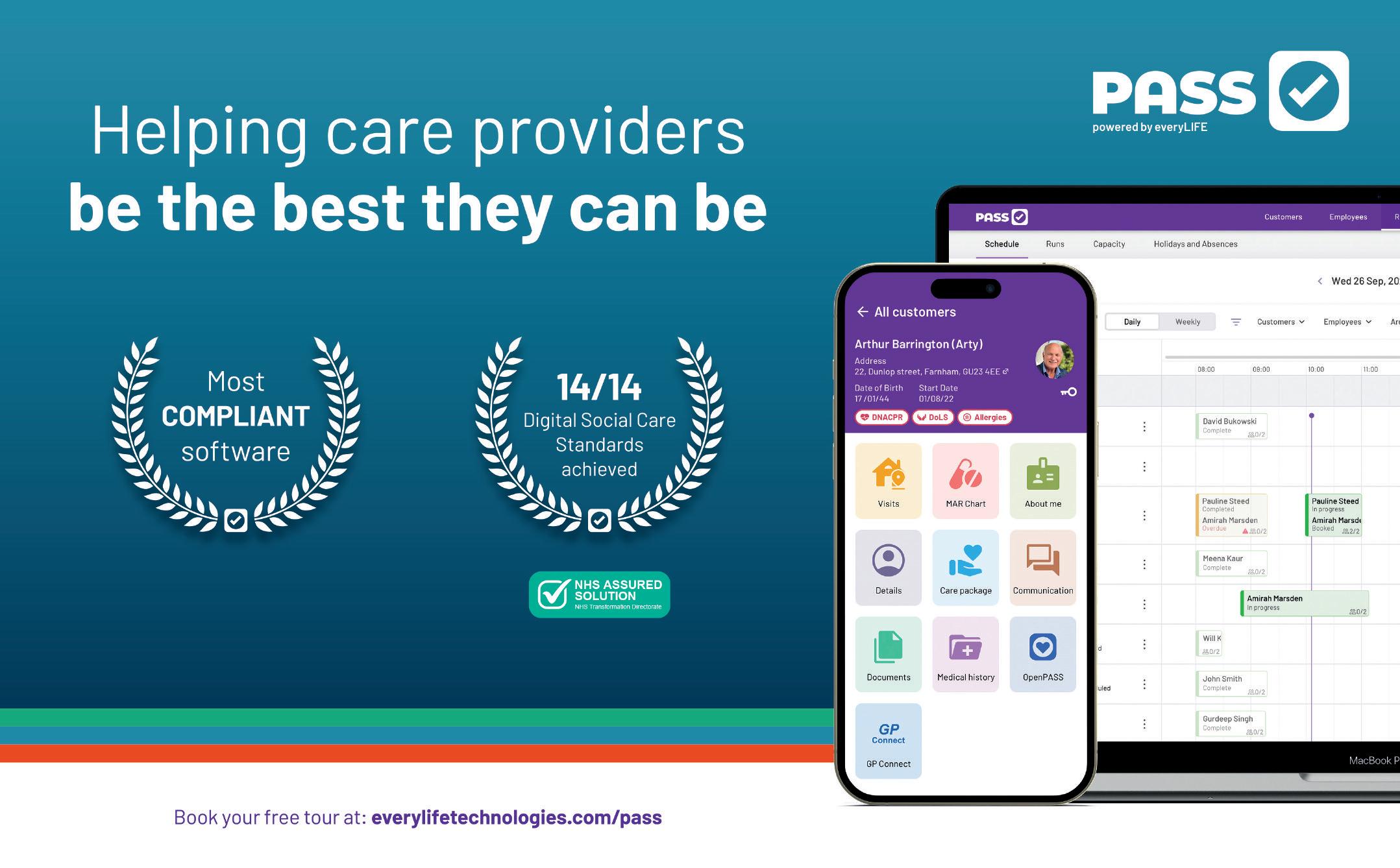
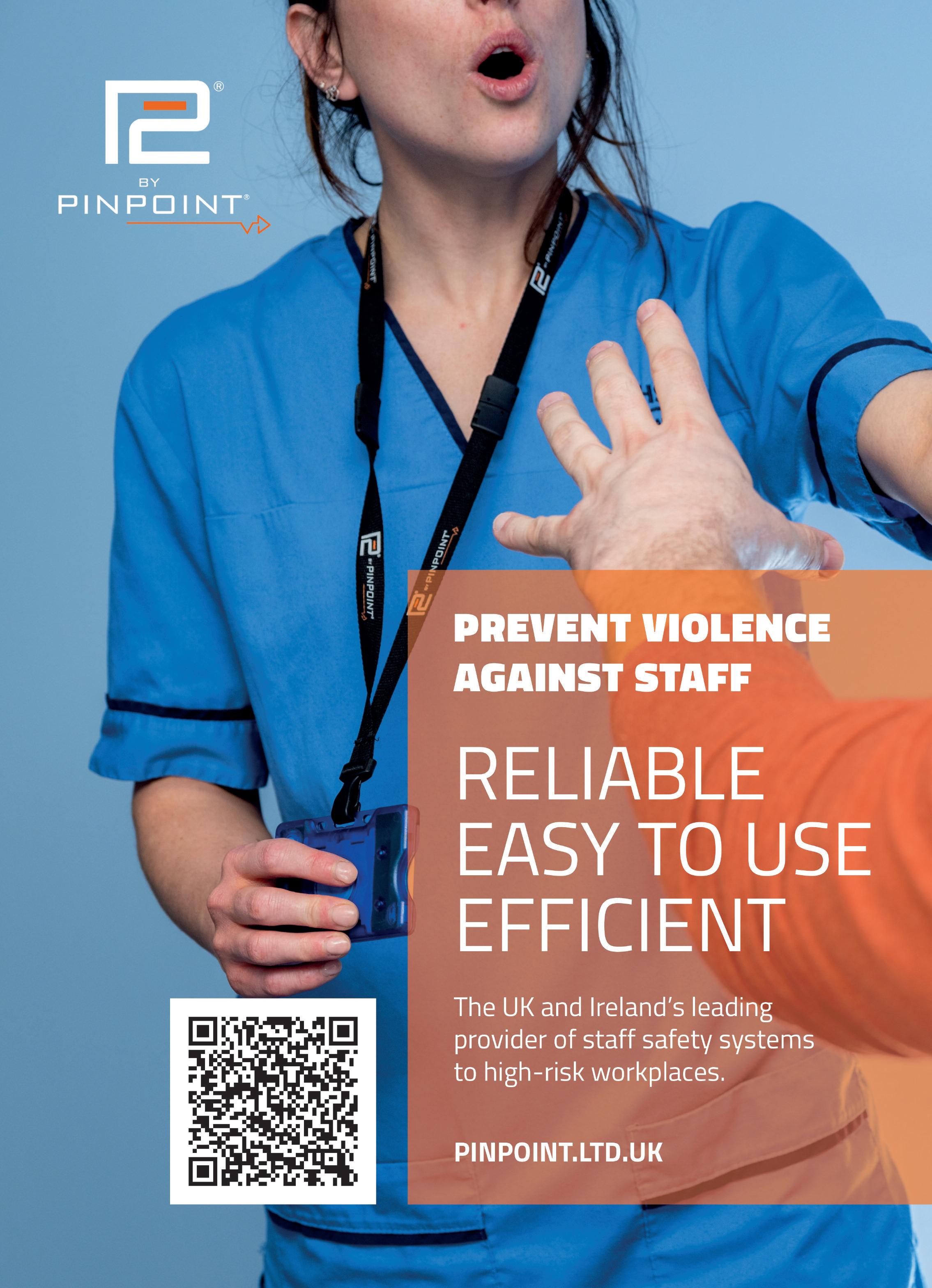




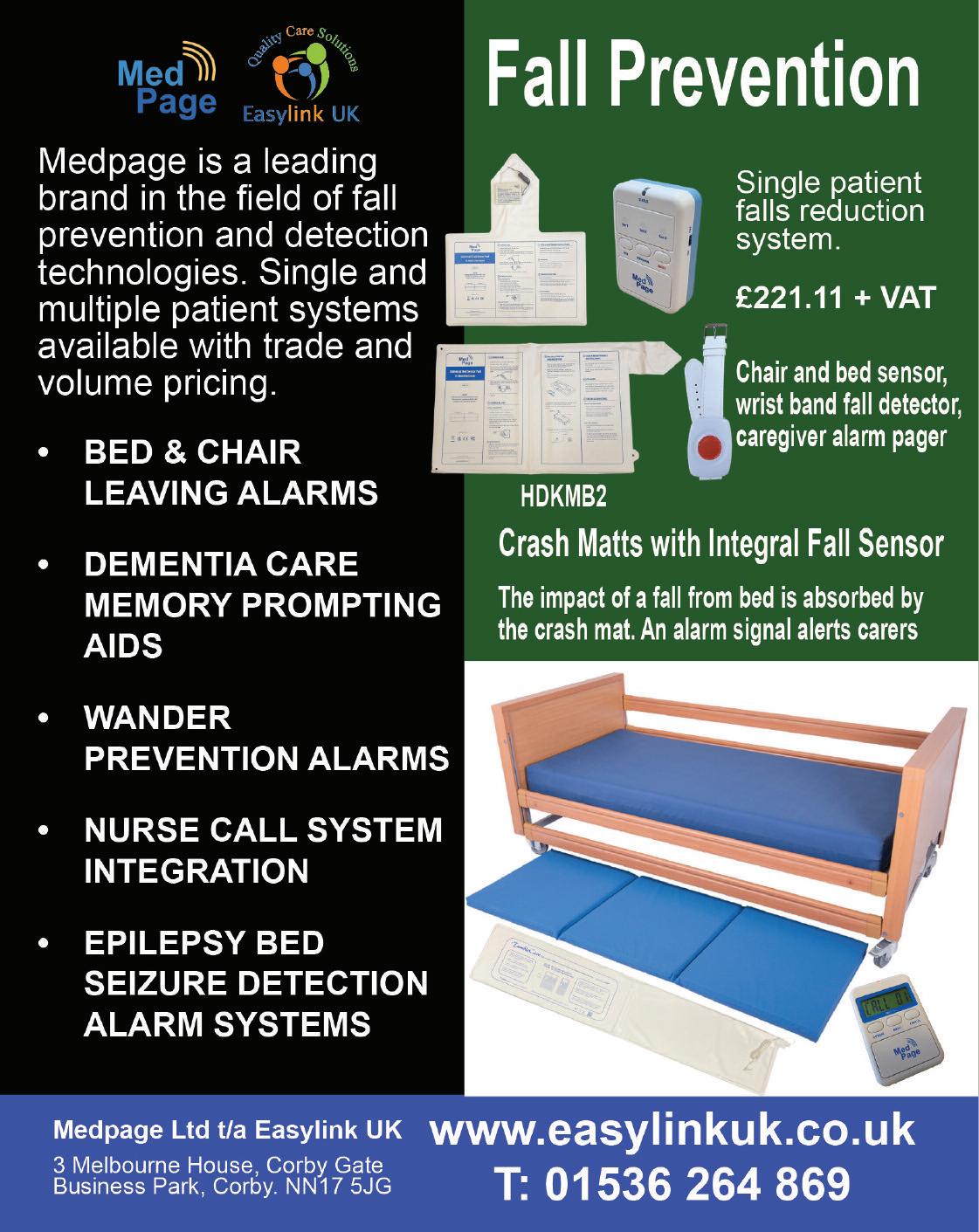




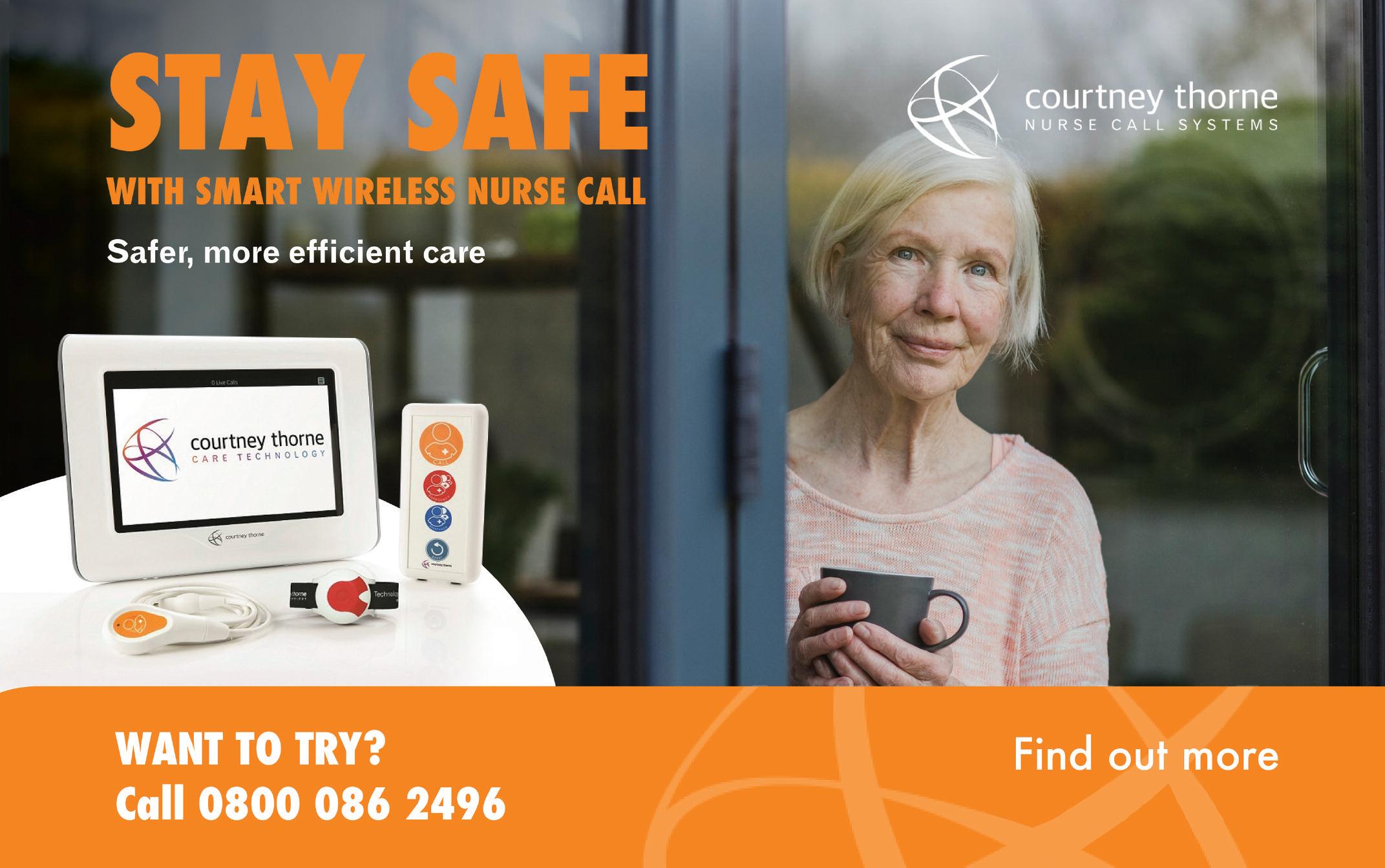
Explore the Char ted Manager Degree Apprenticeship (CMDA) with Mar y Seacole at the University of Exeter
Have you ever wondered about advancing your career, but unsure how to gain the qualifications required whist working? There is an ever-increasing demand for skilled managers within the care sector, and having practical experience is just not enough to fill those positions
Gaining a BSc (Hons) in Responsible Business Manager and

At



Work can and should always be a force for good But one in four workers (25%) in the north of England have experienced conflict at work over the past year, with most choosing not to report incidents such as verbal abuse and harassment according to the 2024 CIPD Good Work Index: North of England report
The research – from the annual survey of close to 900 workers across Yorkshire and Humber the North East and North West - also reveals that victims of workplace conflict suffer more from poor mental health and a lack of trust and confidence in management
As a trusted advisor to the government, the CIPD - the professional body for HR and people development - is calling for employers to ensure line managers are trained and prepared to deal with conflict effectively This starts with addressing the underlying causes such as poor management practices and excessive workloads
WHAT CONSTITUTES AS BULLYING, DISCRIMINATION, AND HARASSMENT?
The world of work is changing at pace and line managers are facing many new people challenges For some employees, homeworking and the rise of technology threatens to create an ‘always-on’ culture where issues can be spread far and wide, across online chat platforms Therefore it’s never been more important for line managers to play a vital role in identifying challenging and dealing with conflict at work
including unfair treatment and sexual harassment
To achieve this they need to participate in regular people management training This should offer specifics around what bullying discrimination and harassment looks like and how to resolve conflict by being able to have difficult yet open and honest conversations to prevent and tackle conflict at work
Managers must also take the time to understand their organisation’s policies and procedures on bullying, discrimination, and harassment and how to report issues in a timely manner, so they are investigated swiftly
IS A MANAGER’S ‘STYLE’ CAUSING CONFLICT AND STRESS?
Managers are at the heart of people s experience of their workplace What they do and say has a significant impact on their team s motivation engagement and overall performance This explains why management style can often be the source of conflict and is the second most common cause of stress at work after unmanageable workload
People managers must reflect on their own management style and the impact their behaviour has on others They should become part of the solution to resolving workplace conflict at an early informal stage before incidents escalate
To do this people managers must be open collaborative and compassionate to create a culture where staff feel trusted and confident to speak up without fear of judgement or being ignored
AVOIDING EXCESSIVE WORKLOADS & AN ‘ALWAYS ON CULTURE’
Rising technology and remote working is giving many employees –particularly parents and carers – a better work-life balance However, the blurred lines between work and home have led to many staff working longer hours to manage increasing workloads – often out of hoursand working when they are ill
Line managers need to take effective steps to manage the main risks of excessive workloads which can cause stress and mental ill health among their workers




the successful franchisee to deliver SecuriCare training programmes in their designated territory
By Daphne Doody-Green, UK Market Director, CIPD
As part of this they must assess individual and team workloads to make sure they are reasonable set clear expectations about taking breaks and act as role models for healthy working practices This includes taking time off themselves when sick Providing staff with autonomy to control how, where and when they work is also key to empower rather than restrict them in their roles
MONITORING AND REVIEWING WORKPLACE CONFLICT
Staff attitude surveys will enable people managers and the wider organisation to collect feedback in areas like gender equality and bullying and harassment
Monitoring the gender diversity of the workforce at every level, including for recruitment and promotion will also help to highlight if there is any potential discrimination or harassment on grounds of gender
NEW LAW TO PROTECT WORKERS FROM SEXUAL HARASSMENT
From October 2024 the Worker Protection (Amendment of Equality Act 2010) Bill will strengthen existing protection for workers against sexual harassment
The new law will place a new duty on employers to take reasonable steps to prevent sexual harassment Tribunals will have the power to increase compensation by up to 25% if they find an employer has breached this duty
Therefore it is essential that people managers are proactive and systematic in how they tackle and prevent sexual harassment at work by providing evidence of the reasonable steps taken This includes undertaking regular training and development to understand their role in preventing and addressing sexual harassment
FREE RESOURCES FOR LINE MANAGERS
The CIPD offer a range of free resources for people managers to develop their management capabilities and prevent and tackle workplace conflict including bullying and harassment



But
By Daniel O ’Shaughnessy, Programme Manager - Better Security, Better Care, Digital Care Hub

Check
Strengthen
continuity plan: Ensure it covers how you will manage if you were to lose access to data for a period of time Watch out for our new cyber incident response checklist – coming in October for Cyber Security Awareness Month
Create back-ups Identify what data is essential to running your service, and create a backup separate from


Founded

quality

Mike Whitehead CEO of Danforth Care commented: “Since day one our mission has always been to create a home-like atmosphere for our residents that is safe, secure, and encourages independence We are committed to providing the highest quality of care and services to our elderly residents and we strive to create a place where they can be comfortable while feeling respected and valued The support from Warwick and the financial backing they received from OakNorth will help accelerate our growth highlighted by our expectation to open seven further homes in the coming months ”
Deepesh Thakrar, Senior Director of Debt Finance at OakNorth added: “We were delighted to support Warwick on this project as it emphasises our strong ambitions to do more to
seen them

Email:



